#up next: endless closeups from one and the same scene
Explore tagged Tumblr posts
Text


#the boys and its atrocious lighting#posting this while waiting for the tags to be back on track#up next: endless closeups from one and the same scene#we love karl's face in this house!#billy butcher#karl urban#the boys#. ⸻ ¹⁴ 「ooc.」 ⊣⊢ the insider.#°mine.#°nox.#gif making#gif coloring
83 notes
·
View notes
Text
NieR Automata Anime ep 4-5
Continuing commentary from [part 1] and [part 2-3].
The NieR Automata anime continues to be... really good actually! A really good companion piece to the game, and even if you encountered it in isolation you’d probably get quite a bit out of it. I am increasingly relieved I didn’t judge it solely on the first episode.
As before the focus on this commentary will be looking at how they adapted the game, how it relates to the broader NieR context, references (e.g. books being read by the characters), and also the cool stuff the anime does to take advantage of the new medium.
Episode 4
Episode 4 covers the Amusement Park area and the machine lifeform Simone, aka ボーヴォワール (Beauvoir) in Japanese.
This episode was delayed, with the rushed production of the anime as a whole unable to cope with a COVID outbreak. Given that it’s kind of crazy what an impressive action sequence they deliver.
The episode opens with Machine Lifeforms watching a play. In the game, if you return to the Amusement Park some time after defeating Simone, you can watch a group of machine lifeforms perform a play called ‘Romeos and Juliets’ which has to be seen, seriously...
youtube
In the anime, we open with a less absolutely destructive play, although a machine lifeform still gets stabbed. We see a machine couple with painted-on eyelashes holding each other... and behind them we see a crucified android.

...followed by a rapid montage of her and other androids decaying.
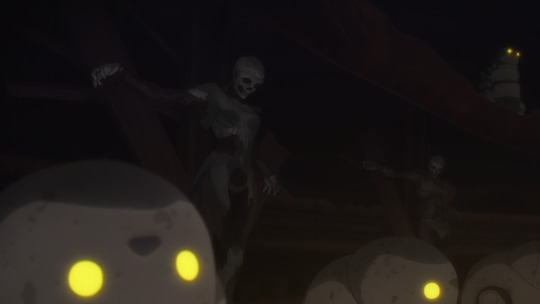
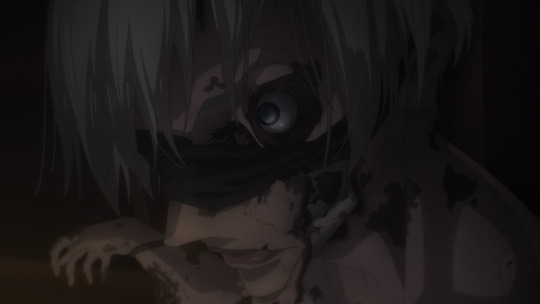
The setup is pretty clear: this is a horror one!
At the Resistance Camp, 2B and 9S are receiving their orders from Lily and Jackass. This serves as exposition that normal androids only drink water...
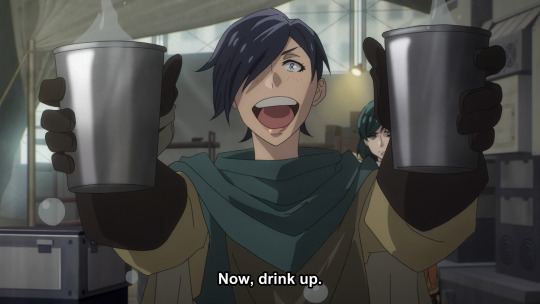
...and YoRHa androids don’t. (Because their Black Boxes come from Machine Lifeforms, but we don’t know that yet!)
They do a great job of distinguishing the body language of Lily (cool, reserved) and Jackass (excitable, broad motions) which wasn’t really possible in the game. Poking and prodding 9S, wiggling like a worm...
The YoRHa recap the previous episode, and Jackass speculates that with the machine lifeforms evolving this way, peace might yet be possible. As we’ll see, 9S’s genocidal streak is really emphasised in the anime; here, he refuses to accept anything other than total annihilation of the machines and foreshadows his ‘I’m going to kill every last one of them’ break from route C...
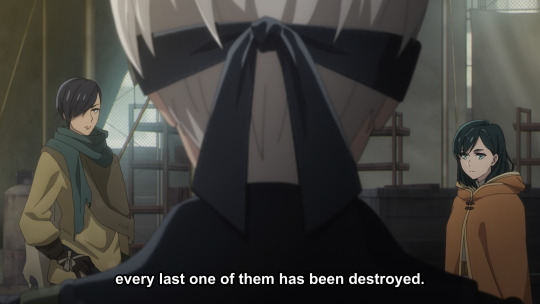
The Japanese is actually quite plain: すべてを、破壊するまだです。It is perfectly valid to translate to “every last one of them” and it fits the dramatic finality of 9S’s line, but you could also just put “all of them”.
Next up we have a scene of the Commander in the bunker. This calls back to the YoRHa stage play, where the Commander pleads to send reinforcement to the YoRHa test squad, and is flatly denied.
Visually, the “Council of Humanity” is here represented by a moon with a segment taken out, resembling an eyeball. It’s a cool visual!

And in closeups, we see a circuit board pattern, which kind of foreshadows that the Council of Humanity is not human at all...

The Council declares that Adam, Eve and other unique machine lifeforms are all part of the plan, and to continue to use the Resistance as decoys.
YoRHa’s plan is completely nuts honestly. Not surprisingly since it was concocted by a traumatised android shortly before he blew up, but seriously. The primary aim of YoRHa is propaganda, to motivate the resistance to fight harder to overcome the machines on behalf of a phantom humanity - but they treat that same resistance as worthless and disposable constantly so who’s even supposed to spread the legend of YoRHa? They sacrifice endless units to goofy experiments to try to find the most efficient personality types, even though they’re planning to sacrifice the whole army in the end. They spend a huge amount of resources on attempting to squash security leaks among the androids, such as the Executioner type units, but their base security is completely useless against the machines.
But that’s the point, right? YoRHa is irrational bc the huge forces that we are caught up in are just as irrational. And thinking of this as a purely rational military operation, rather than something happening for religious reasons, is a mistake.
After this, we lead into the main plot of the episode, with 2B and 9S on their way to investigate the Amusement Park region. Before that, however, they see a supply launch to the moon; further foreshadowing.
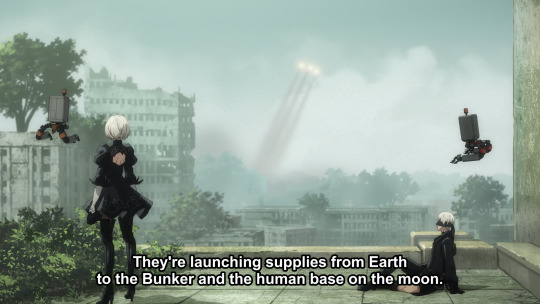
Later, 9S will discover that the shipments to the moon contain only water, indicating that the moon is only populated by androids and there are no real humans. So the beginning of this episode has all been setup.
We get a message from from the crucified android. “Ah, what a beautiful stage...” - setup to the dichotomy of beauty and death that is going to be the theme explored in the rest of this episode.
Like in the game, the route to the Amusement Park from the City Ruins passes through a sewer. We get a brief montage of painted scenes from the game, including the rabbit boss...
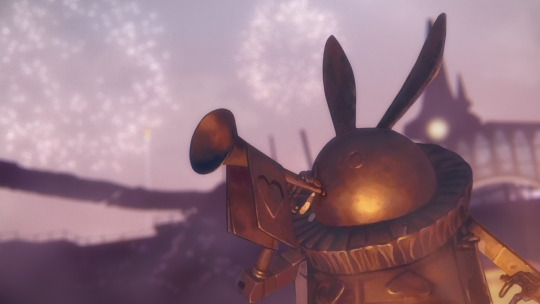
...and the rollercoaster...

But we’re not going to dwell very long in the Amusement Park before going straight to the stage.
A Beautiful Song begins in a music box version, and we see the machine lifeforms from the play earlier professing love. Pod 153 explains the concept of the theatre to a dismissive 9S; then the players explode and Simone enters.
The outset of the fight is fairly close to the game, although there’s some small differences.
Like with the Engels fight, Simone is a 3D model, while 2B and 9S are 2D animated into a 3D scene with 2D effects animation. The CGI still doesn’t look great, but broadly it’s executed much better here. There’s some seriously impressive mobile camerawork.
In the game, you don’t get much of a sense of what Simone’s deal is in your first playthrough as 2B, but then as 9S you get visions of her motivation. She wants another machine, named after Jean-Paul Sartre and goes to increasing lengths to ‘become beautiful’ - returning to a constant refrain of ‘he won’t look my way’. (In real life, Sartre and de Beauvoir had a polyamorous relationship; Sartre was the one jealous. I gotta actually read de Beauvoir to get a better sense of what NieR is riffing on, if it is).
In the anime, the emphasis is less on Sartre, although we do see him...
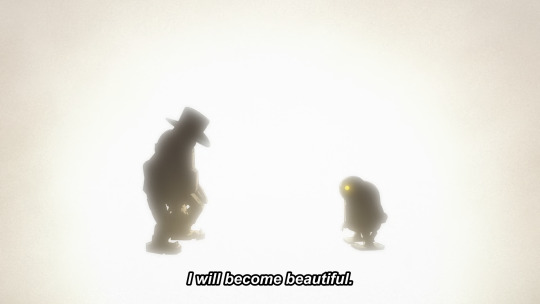
The flayed, still-living androids on posts come in to open what will be a parade of ero-guro imagery...
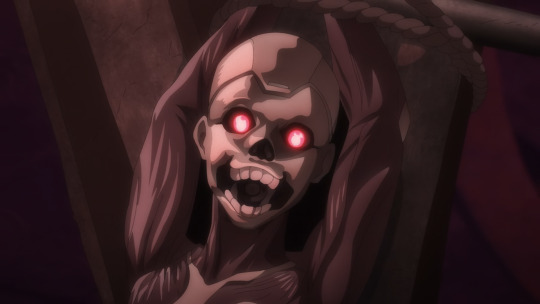
Things really get going with dat psychosexual imagery, though, once 9S hacks into de Beauvoir. As we’ve seen, the anime presents hacking as a kind of full-immersion VR where 9S dives into the memories of the hacking target. Inside de Beauvoir, he first finds a huge space full of images of feminised machine lifeforms, the plates shattering as he walks past...
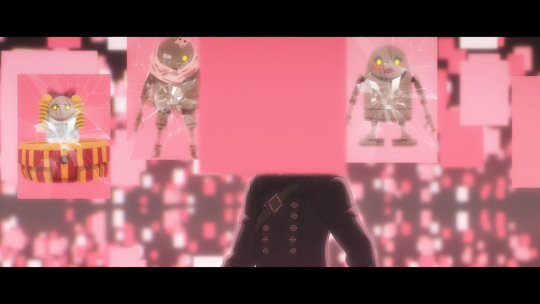
The hacking space is indicated by letterboxing a cinematic 2.39:1 aspect ratio.
He finds a mirror and then is confronted by an array of photos of the same machine in a red dress and various kinds of makeup. The floor transforms into a huge made up face.

9S shatters it with his sword. Outside the hacking dimension, 2B is holding him in a pietà pose. Simone explodes her dress and goes into bitey girldick mode.
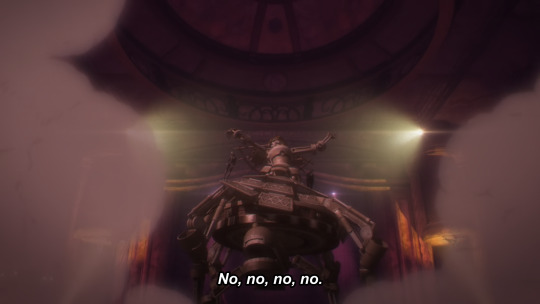
Back in hacking space, 9S finds himself in a misty swamp containing a giant statue of an indifferent Sartre. With a Dutch angle to make it look extra big.
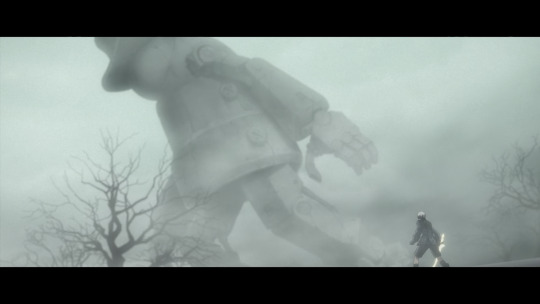
A representation of Simone with smudged makeup shows up in a wedding dress.
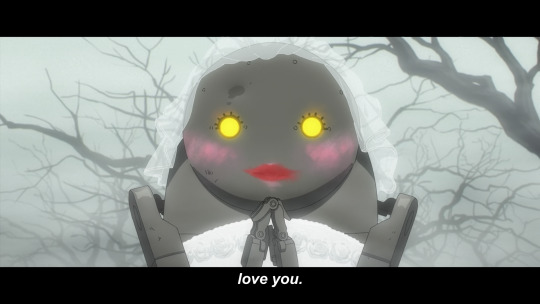
9S stabs her, she turns to sludge, arms drag him underwater, and he finds himself arm-bondaged to a wall in a bedroom full of discarded dummy/doll parts.

Simone, here a generic Small Stubby, discards parts until giving up in frustration, with scribbles all over her face, and comes to 9S where she starts trying to rip off his arm.

Abruptly she is pulled into a giant metal mouth. (Check out those bendy smears!) A match cut identifies this mouth with the big girldick dentata menacing 2B.


In the hacking world, a huge grinding wheel appears inside the mouth, reminiscent of Marx. Simone now stumbles blindly around the fight arena, bouncing off the walls. 2B orders Pod 042 to let her hack, despite the risk of a B unit attempting hacking.
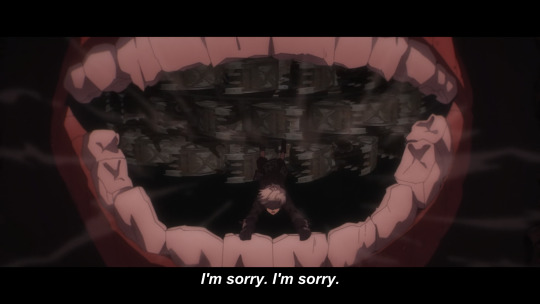
Given how coldly she has treated (this incarnation of!) 9S until now, this might underline that there’s more going on with her feelings about him. If the first episode didn’t massively tip its hand there lol. Anyway, she arrives just in the nick of time to save 9S from getting ground up.
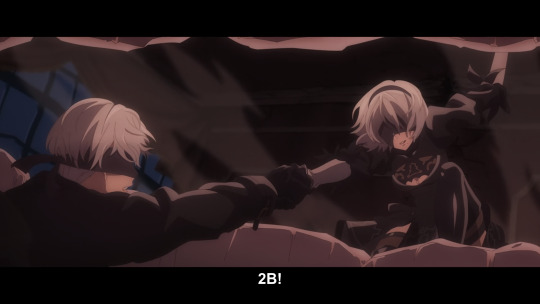
...kinda Utena-like framing there maybe?
This prompts Simone to charge atop the spinning wheel, giving 9S an opening to throw his sword into her face. The effect of this is to explode the metal covering.
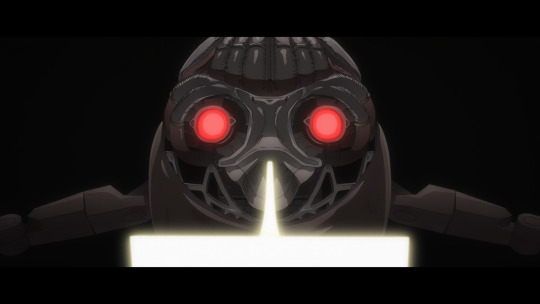
The inner structure of her head suggests that 9S has actually smashed the teeth as well and gone straight into her throat with his sword. Hmm. HMMMMMMMMM. Yeah ok.
This gives 2B and 9S an opening to destroy Simone’s core with the pod laser. We get a final shot of her catching the attention of Sartre at last...
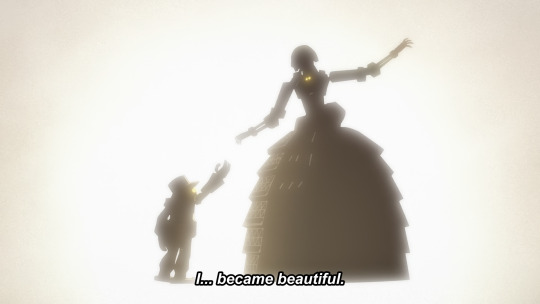
We see Simone’s core disintegrate - further setup for the eventual reveal that YoRHa Black Boxes are built from Machine Cores.
After the battle, the two machines from the opening come in to see the play and give flowers to Simone, one of them referring to her as ‘mum’! Suggesting that maybe Simone and Sartre went further in their relationship and adopted some Stubbies as kids in this version? 9S tramples the roses to mercilessly cut them down.
The puppet show this time is pretty brief and the ‘ending’ is basically that the commander pushes the bunker crew too hard.
So, to comment on this episode: in the game, the Simone fight is extremely cool - bringing to mind the Intoner fights in Drakengard 3, but considerably better executed! - but ultimately you just defeat Simone the same way you would defeat any normal enemy. If you hack her as 9S, I don’t believe you get any special hacking zones.
Here, they’re going all Silent Hill with the sexual imagery. I’m still not entirely sure what I make of the whole Simone episode of NieR Automata. There’s definitely something of the transfeminine monster angle in the whole ‘massive bitey schlong’ thing, the “Buffalo Bill” pursuit of feminine beauty by destroying someone else’s body (in this case, the androids that Simone uses as adornment). They’re mixing together a whole lot of images here: we already had the stage itself, gibbeted corpses, Wagnerian opera, the usual YoRHa doll imagery; now we can add the big juicy mouth stuff and a bit of bondage too. The Machine Lifeforms are generally trying to explore different ways of being human, and Simone represents insecure vanity leading to an obsession with aesthetics that can never really be satisfied. But there’s a reason ‘unrequited feelings’ is such an enduring subject for stories.
In the game, when you defeat Simone, there isn’t much of an immediate followup. The final scene with 9S killing the two childlike machines is a good one for setting up the later developments, and also for creating more of a contrast between the affects of the two MCs. 9S is interesting because he has much more access than nearly anyone to the inner lives of the machines, but also he is one of the most insistent that the machines don’t have real subjectivity, and they’re playing that up here in the anime.
Episode 5

Now we get Adam and Eve for real! In this episode we get a couple of their rooftop scenes from the game. The anime has more room for character animation, to express Eve’s fidgety boredom.
We see a lot of books in this episode. In the first scene, Adam is reading Being and Nothingness, by Sartre. Later, in Pascal’s village, we see his bookshelf contains Shakespeare’s The Merchant of Venice and five volumes of Republic, presumably Plato’s.
In the final scene of Adam and Eve, Eve is grumbling about having to read a book titled Natural History, possibly the one by Pliny the Elder. Adam is reading a book titled Vice Amply Rewarded, which is the subtitle of the novel Juliette by the Marquis de Sade.
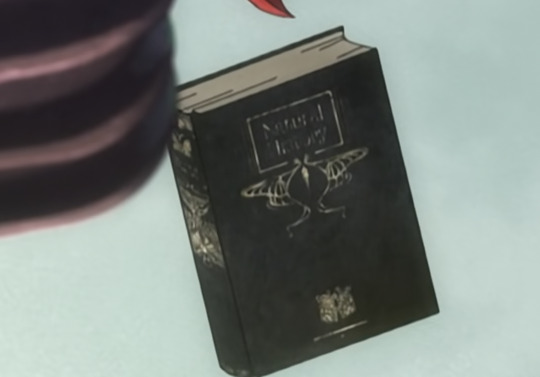

OK, the plot of the episode proper! This one’s kinda great! We finally get the introduction of Pascal and the pacifist village, but rather than simply reprise the game, we add some cool new elements...
We open with 2B and 9S making their way across the ravine to the department store.
They changed the geography a bit here. In the game, you meet the pacifist machines right after defeating Simone, and their area can be accessed by a series of bridges from the Amusement Park; later it connects to the City Ruins and the Forest zones. The department store is very small, and it’s a route to the forest zone, but it is notably where you first meet Emil, who bursts out of the inside of a Machine Lifeform’s head which really underlines the similarity. It’s also where Emil made his underground monument to Kainé, full of Lunar Tears, where 2B will eventually be buried. But the above ground part of it is pretty barebones, just a large room.
9S excitedly picks over toothbrushes, plates, pans and even a PS4 - the first platform that NieR Automata was released on.

He asks 2B to call him ‘Nines’, but she refuses. (She knows she’ll have to kill this 9S eventually, and she’s trying not to get attached.)
The department store is much larger in the anime...
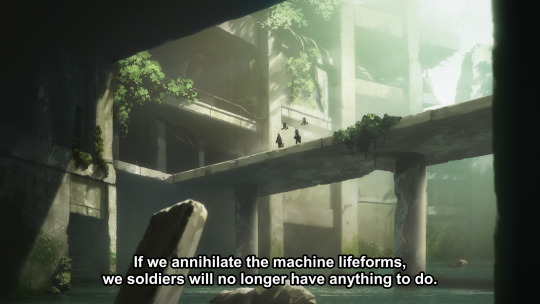
9S explains how he wants to go shopping with 2B and buy her a T-shirt after the war. His body language is really cute. 2B shuts him down with the usual ‘emotions are prohibited’.
They meet the Machine Lifeform village, where they’re all waving white flags. The Machine Lifeforms in the village are a mix of 2D animation and cel-shaded CG, and the first half of the episode is 9S getting over his skepticism that there could be peaceful machine lifeforms disconnected from the network, and deciding to try to learn more about them.
One interesting difference from the game is that here, the Stubbies actually come in a variety of sizes...

...cementing the roleplaying of ‘parents’ and ‘children’ in the village. We see various machines in outfits either painted on or made out of scraps of cloth; there’s a couple of cameos of sidequest characters from the games, notably the pair of sisters with pink and blue bows:
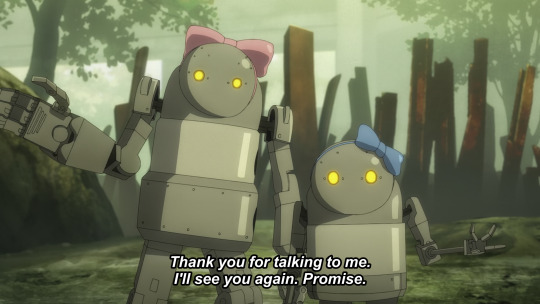
Sadly the part of the dynamic where the Medium Stubby was the big sister and the Large Stubby was the younger sister seems to have been dropped.
After this montage, things diverge from the game in a really interesting way. 2B and 9S see a ravine by the edge of the village, and descend, where they find...

...a tree with an Emil in it! 9S determines he can hack this Emil because something something radio waves, and dives in to find memories of NieR Replicant while Emil (Sacrifice) plays:

The desert outside Facade.
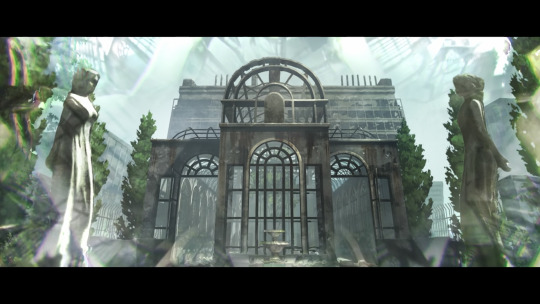
The garden in the Shadowlord’s ‘castle’, the last thing the gang saw before Devola and Popola’s betrayal.

Devola and Popola’s library, with the roof broken open by the Shadowlord’s attack; a highly traumatic location for Emil since this is where he was forced to use his power to turn Kainé to stone to protect the village.

Kainé and Grimoire Weiss; likely the scene where Kainé was revived after the time skip. Kainé acknowledged Emil immediately despite his changed form.
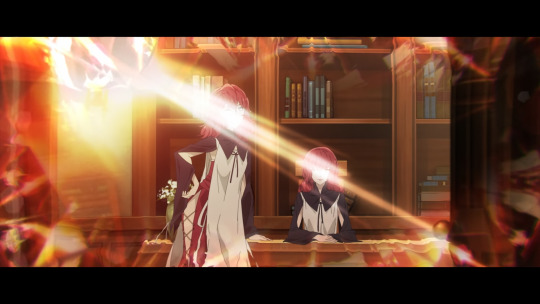
Devola and Popola in the library, their faces obscured, representing their deceit. The one time Emil entered this office, they told him and Kainé to sleep outside the village.

Nier himself, taking care of Yonah. Not entirely clear when Emil would have seen this!
Emil forcibly discconects 9S, but 9S pulls up some data about him.
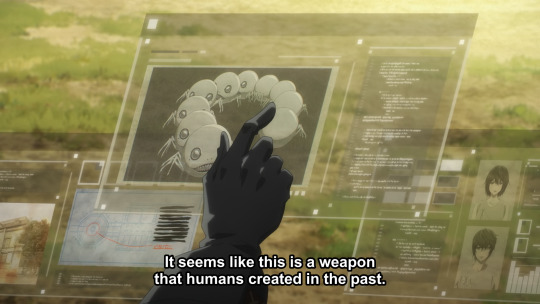
This is very different to what happens in the game, where 2B and 9S don’t have the first clue what Emil is and almost attack him on their first meeting! The pane on the left shows Emil’s mansion and the fountain which conceals the entrance to the hidden lab; the pane in the middle shows the multiple-Emil head form he adopts during the optional battle in the desert before changing to Halua chained up underground; the pane on the right shows Emil and Halua in their human forms before the evil child experiments. 9S refers to Emil as a weapon, an ‘it’.
At that point Pascal arrives and explains the pacifist village worship Emil(!) and that’s why Pascal stopped fighting. We get a flashback which uses a high contrast saturated colour scheme reminiscent of Takashi Koike, one of the coolest sequences in the whole anime.
Just like P-chan/Beepy did when rising from the mountain, Emil says one word: 生きて (live!) The magical force of this command causes Pascal to awaken. We get to see an older version of the Machine Lifeform army, where the fundamental modular unit is a Pascal-like chassis:
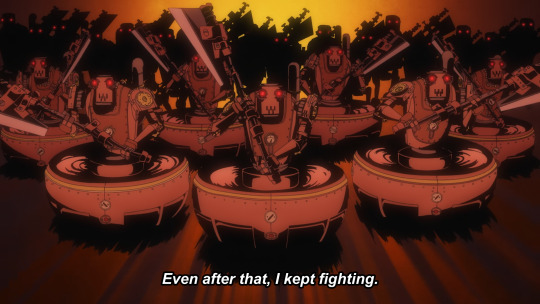
Pascal is given the ability to fear death. And he’s terrified by his indifference to the lives of his comrades. だから。。。
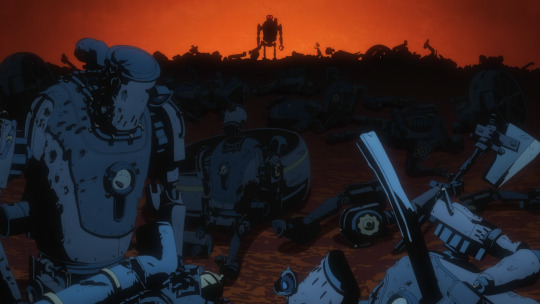
...he becomes a pacifist, and founds the village.
As Pascal is pulled back to the other machines, one of whom has found a music box (from an earlier sidequest at the resistance camp... I have so much useful knowledge in my brain lmao), 9S retreats to a nearby rooftop and derides them as selfish as it starts raining in a big old pathetic fallacy moment.

He says separating from the network and yet forming a village is a contradiction. 2B and pod 153 reply that it is impossible to live alone. 9S’s vision flickers with a glitch, showing the department store briefly...
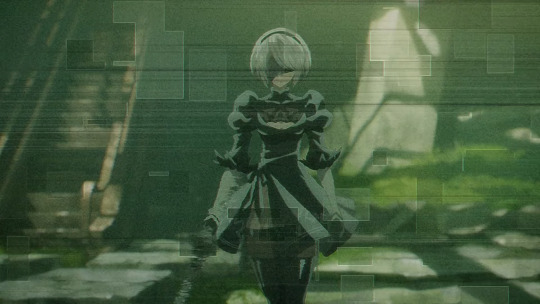
He awkwardly tries to cover for it by making a kinda childishly flirty comment towards 2B - one that underlines the distance that still exists between them and 9S’s sense of loneliness. 2B gets it and instructs Pod 042 to mark the department store so that one day in the future, they really might go shopping there...

But we end the scene in an indirect mirror shot of 2B looking after him with a grim expression.

She knows that isn’t happening. (Don’t think too hard about the perspective of this shot lmao.)
As 2B and 9S return to the village, they see one of the machine children trying to keep the music box to itself...

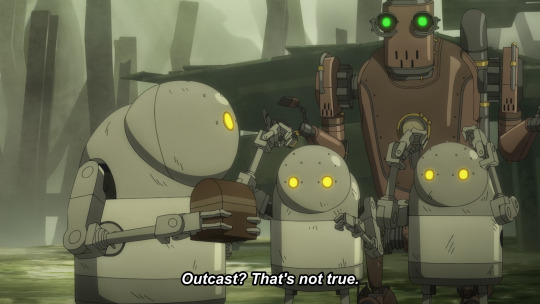
Pascal is hopelessly ill-equipped to stop the conflict and the children fight; inevitably the music-box is broken.

The androids observe that, even in the pacifist village where there is no war against the androids, conflicts still break out just due to conflicting interests. 9S almost intervenes, but is interrupted by a message from Operator 21O.
Finally we have the last scene with Adam and Eve.
The post-credits puppet show omake scene depicts the effect of the self-destruct input, which causes 9S’s shorts and 2B’s skirt to get blown up ingame. This leads to sexy illustrations of both androids...

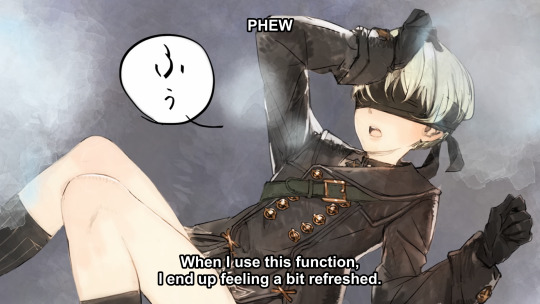

Unfortunately Emil gets the same idea.

We get ending Y from the game, where Emil kills everyone on Earth. I think this would be incomprehensible if you haven’t done Emil’s mission in the game.
All in all, a really cool episode. I loved the style of Pascal’s flashback and it’s cool to flesh out his character a bit more. Creating a connection between Emil and the pacifist machines is fascinating. The game definitely intimates towards a connection between Emil and the Machine Lifeforms from the moment Emil is introduced, and given that Emil was fighting the aliens, it seems very likely that they built the Machine Lifeforms in his image. But I don’t know of anywhere this is actually spelled out explicitly (and it’s kind of contradicted if the old model of Machine Lifeform looked like Pascal). Still, if that was true... in a sense you could even say the Machine Lifeforms give Emil - the last surviving human, permanently kept in this child state by his magical immortality - a way of growing up!
Also it’s nice to see anime Kainé lol.
I had a lot of doubts about this adaptation at first, and the conditions it’s being made in are pretty dire honestly, but despite all that, they are genuinely managing to add something that makes the adaptation a worthwhile addition. They’re being reasonably judicious with the action, which lets it be really flashy when they do show it; I’m really looking forward to seeing what they do with characters like Gruen and the Forest Kingdom later. Most importantly, they seem to be getting the tone right.
If we’re up to episode 5 and we’ve only just met Pascal, I can only assume they won’t cover the entire game in this one anime. I suspect they’ll probably just take it up to the end of Route A/B - at least, I hope they don’t try to cram the whole of Route C into a couple of episodes.
Anyway, really glad this is turning out to be good after all. I still need to write up NieR Automata on my NieR guide pages and I’ll definitely be including this anime when I do.
#nier automata#anime#nier#nier automata anime#nier automata spoilers#computer games#nier automata ver1.1a
11 notes
·
View notes
Note
Hi! I was just watching good omens and I came up with some questions, but I didn't know whom to ask, so I was digging around for go analysis blogs and found you. *takes a breath* So, I was wondering if you had any thoughts on why Heaven's camera angles are the way they are. I noticed that, in heaven, the camera tends to focus on the characters' heads specifically, so they fill most of the screen. Either it's a meta reason or a reference to something (like Newt with the Office) that I'm not getting. That's the main thing, but I've also wondered why exactly Aziraphale uses the verb "fraternize" in the 19th century. It seemed an odd pivot from caring about Crowley's safety to Heaven's rules. Thanks so much!
Hello! Omg yes, let's talk Good Omens cinematography.
First, the obligatory Analysis Disclaimer: I doubt there's a specific interpretation that you're just not getting, some singular, "correct" reading of the scene(s). Two years past release, I'm positive the fandom as a whole has come up with plenty of ideas (I mostly hang on the periphery. I'm far from up to date with GO meta), but any and all of it will, by nature, be subjective. Thus, all I can offer is my own, personal interpretation.
So for me? It's about intimacy.
Not intimacy in the sense of friendship, but rather the broad idea of closeness. Confidentiality. Emotion. Knowledge. Understanding by means of literally getting into the thick of these conversations. I love the camerawork in Heaven (and elsewhere) because the camera itself acts like a person — an additional party to these interactions. And, since we're the ones watching this show via the camera, it makes it feel as if we're peeking into scenes that are otherwise private. Obviously all cinematography does this to a certain extent, the camera is always watching someone or something without acknowledging that we're doing the watching (outside of documentary-esque filmmaking), but GO uses angles and closeups to mimic another person observing these scenes, someone other than the characters involved.
The easiest example I can give here is when Michael makes their call to Ligur. Here, the camera is positioned up on the next landing of the staircase, as if we're sneaking a look down at this otherwise secret call. There's even a moment when the camera pans to the right to look at them through the gap in the railing, briefly obscuring Michael from our view.

Here, a standard expectation of any scene — keep your character in focus — is done away with to instead mimic the movements of someone actually hiding in the stairwell, listening in on the conversation. It creates that feeling of intimacy, as if we're really there with Michael, not just watching Michael through a screen. The camerawork acts like a person overhearing an illicit conversation prior to falling back on mid/closeup shots. We're spying on them.
To give a non-Heaven example, the camera helps us connect with Aziraphale during Gabriel's jogging scene. It's hard to show through screenshots, but if you re-watch you'll see that the camera initially keeps them both in the frame with full body shots, allowing us to compare things like Gabriel's unadorned gray workout clothes with Aziraphale's more stylish outfit; one's good jogging form and the other's awkward shuffle. However, this distance also creates the sense that we're jogging with them, we're keeping pace.
That is, until Aziraphale begins to lag. Then the camera lags too, giving them both the chance to catch up, so to speak.

Until, finally, Aziraphale has to stop completely and the camera, of course, stops with him. We're emotionally attuned to Aziraphale, not Gabriel, and the camerawork reflects that. Even more-so when we cut to a low shot of Gabriel's annoyed huff at having to stop at all, making him appear larger and more imposing. Because to Aziraphale, he is.
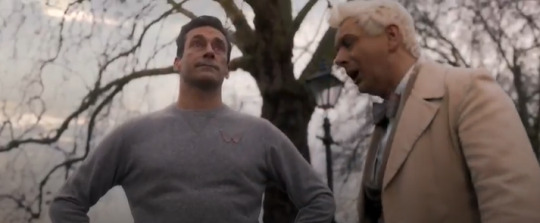
This work carries over into Heaven's other scenes. The closeups are pretty much a given since, whether it's Gabriel realizing Aziraphale has been "fraternizing" with Crowley (more on that below!), or Aziraphale choosing to go back to Earth, the scenes in Heaven are incredibly important to the narrative. Closeups allow the viewer to get a good read on each character's emotional state — focusing on minute facial changes as opposed to overall body language — and that fly-on-the-wall feeling is increased as we literally get an up close and personal look at these pivotal moments.
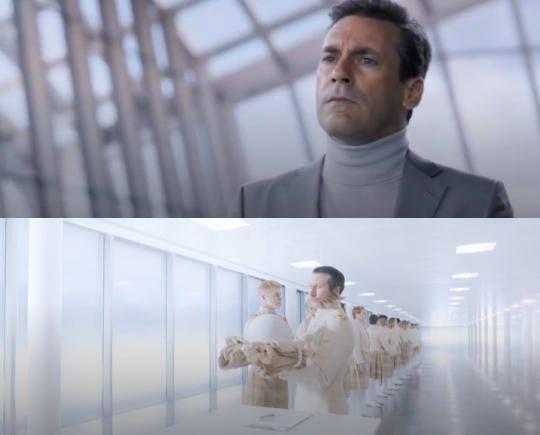
Compare a shot like this one of Gabriel to the line of angels ready for battle. We don't get closeups on any of their faces because their emotions aren't important. Yes, that's in part because they're background characters, not main characters, but a lack of emotion — their willingness to enter this war without question — is also the point of their presence in this scene. So they remain a semi-identical, nearly faceless mass that runs off into infinity down that hallway, not any individual whose inner life we get a peek at via a closeup.
I particularly like Aziraphale's conversation with the angel... general? Idk what to call this guy. He's just gonna be Mustache Angel. But, getting back on track, his scene has a lot of over the shoulder shots which, admittedly, are pretty common. From a practical perspective they're used to help the audience situate both characters in the scene — you're here, you're there, this is how you're spaced during this conversation — but it can also help emphasize that closeness between them. Keeping both characters in the shot connects them and though Aziraphale and Mustache Angel definitely aren't on the same page here, those shots help cue us in to the unwanted intimacy of this moment. They're both angels... even though Aziraphale no longer aligns himself with them. They're both soldiers in a war... but Aziraphale will not fight. This angel has a list of Aziraphale's secrets, including that he once had a flaming sword and lost it... but Aziraphale doesn't want to admit those circumstances to him. This angel wouldn't understand, even if he did. Intimacy here, connection and closeness, is something discomforting because Aziraphale can no longer embrace those similarities. They put him (and us) out of sorts, so when we get them both in frame, that connection creates tension, not relief.

And many of those over the shoulder shots are given sharp angels, or the camera is placed too close to the "off screen" party. Compare a shot like Luke and Rey to Aziraphale and Mustache Angel. Here, Luke is a clean, solid line on the left side of the screen, just enough there to cue us in to where he is in relationship to Ray, In contrast, Mustache Angel's mustache is Too Close and proves rather distracting. Rey and Luke are connecting here over being Jedi with responsibilities to uphold (or at least, Luke will acknowledge that connection later lol); Mustache Angel is forcing a connection with Aziraphale that makes everyone uncomfortable.

We are too close to him here. He feels too close to Aziraphale too. This whole conversation is upsetting and discomforting, pushing Aziraphale to finally choose which side he's on (his own with Crowley). The shots aren't meant to subtly keep the audience from getting lost and then otherwise be unobtrusive, we're supposed to be Very Aware of this angel's body and how close he's getting to the character we've come to identify with — both literally (he's leaning in) and in terms of forcing Aziraphale to finally make his choice.
When Mustache Angel marches forward and gets all up in Aziraphale's face, the camera positions itself behind Aziraphale in a way that makes it feel like we're hiding behind him, with Aziraphale taking up far more of the screen than Luke does. Like the scene with Michael or running with Gabriel, the camera often likes to mimic a "realistic" response to these events. This angry, shouty angel is getting closer, best take a step back and stay out of sight behind Aziraphale, holding his ground.
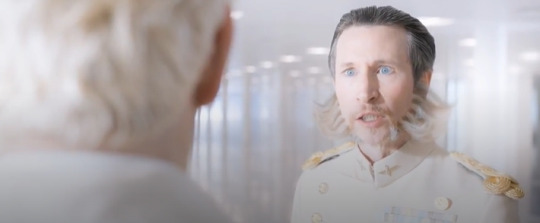
These closeups also serve as a nice contrast to the wide and longshots we get of Heaven. It's an imposing place with skyscrapers in the distance, lots of steel, immaculate floors, and endless white. It's overwhelming and it's cold. But then we cut to those mid-shots of Gabriel and Michael, telling us that they're in control of it all.
Aziraphale? Aziraphale is not in control. Not now, anyway. When he appears in Heaven we get a longshot to show off this endless void and he's just another, tiny speck in it. If he weren't flailing around — an acting move that likewise helps sell how out of his depth he is — it's unlikely you'd even notice him. Aziraphale's clothing and hair blends in perfectly with the background. He's forgettable. Easily overlooked. Someone to underestimate. And when he moves, he has to come to the camera. We don't cut to Aziraphale to establish control like we do with Gabriel. He's left to awkwardly shuffle up to Mustache Angel until he's finally come into view.

Yet when Aziraphale makes his decision, he aligns himself with the brightest, most colorful, most interesting thing in the room: Earth. Earth, with all its messy individuality, is the antithesis to Heaven's controlled uniformity and a bright blue orb hanging in the midst of all this white helps remind us of that. Aziraphale rejects becoming one of the identical soldiers and instead literally reaches out for the one thing in Heaven that doesn't fit in.

When he leaves, we get an extreme closeup for the first time. Mustache Angel is pissed and as such we not only get a good look at his face in the aftermath of Aziraphale's choice, but that extreme closeup on his mouth as he's shouting too. It's like he's shouting directly at us, the viewer who is currently cheering on Aziraphale's decision. There's a war, dammit... but we don't care. Not in the way he cares, anyway.

So there's a lot! And I could probably go on, but apparently I'm only allowed to add 10 images per post now (tumblr what the actual fuck if anyone knows a way around this please share!) and I've already had to merge a bunch of images like an animal. So let's awkwardly finish up with the duck pond scene.
...without a GIF because they apparently count as images too 🙃
Simply put, I don't think Aziraphale bringing up fraternizing is a pivot from one to the other — from caring about Crowley to caring about Heaven's rules. I mean yes, Aziraphale is lagging behind Crowley in terms of rebellion and a part of him is, at this point, absolutely concerned with how he'll come across to the higherups, but that worry doesn't stem solely from a (now very shaky) desire to obey for the sake of obeying. The thing is, Aziraphale's disobedience is, by default, also Crowley's disobedience. If they're friends and they're ever found out, they'll both get in trouble. Which, we know from the end of Season One, basically means being wiped from existence. That's horrifying! And it's a horror that threatens them both. I don't think Aziraphale cares about rules for the sake of rules; after all, he started off by giving away his sword, lying to God, is currently meeting with Crowley anyway... this angel has always ignored/bent the rules — established and implied — that don't suit him. Rather, he cares about the rules if he thinks they have a chance of being enforced. If there will be consequences for breaking and bending them. This is still about caring for Crowley (as well as saving his own, angelic skin). If they're found out, Crowley dies. And, as we the viewer learn, Heaven was indeed observing them that whole time. There was always legitimate risk attached to this relationship. Aziraphale's fear, hesitance, and at times forceful pleas to stop this stem as much from Aziraphale worrying about Crowley's safety as they do a learned instinct to obey the rules without question. He pushes to end the relationship because the relationship threatens the only thing Aziraphale cares about more than that: Crowley himself.
As for the term "fraternizing," that's a loaded one! I won't go into a whole history lesson here, but suffice to say it has military roots: to sympathize as brothers with an opponent. That is literally what Crowley and Aziraphale are doing. They are an angel and a demon, supposedly innate enemies, supposedly poised for an inevitable war... yet they've formed an incredibly strong kinship. They've both learned to love their enemy, the thing every army fears because, well, then your army won't fight (just as Aziraphale won't). However, beyond the enemy implications, "to fraternize" eventually took on a sexual meaning: to not merely love as a brother, but to lay with the enemy too, usually women from enemy countries (because, you know, heteronormativity). Nowadays, "to fraternize" often implies a sexual component. I've been rewatching The Good Wife lately and in one subplot, the State's Attorney cracks down on fraternization in his office. He doesn't mean his employees are forming bonds with assumed enemies, he means his employees are having sex on his office couch. So Aziraphale's phrasing here carries a LOT of weight. He's both reminding Crowley of their stations in the world — you are a demon, I am an angel, us meeting like this can have formal, irrevocable consequences for us both — as well as, given the fact that this is a love story, drawing attention to the depth of this relationship. They love one another, as more than just friends. Though whether Crowley's scathing "Fraternizing?" is a response to Aziraphale falling back on the technicalities of their positions, or acknowledging a love he's yet to overtly admit and commit to — or both! — is definitely up for debate.
#Good Omens#Ineffable Husbands#Air Conditioning#mymetas#whew#long post!#with too few images imo#with this done I'm gonna steam#about tumblr's absurd limitations#how's a girl supposed to do meta on this website anyway
85 notes
·
View notes
Text
Recap/review 15.20: “Carry On”
I’ll warn you right now - I did not hate it.
THEN: Chuck loses. Jack is God. The Winchesters are finally free.
NOW: Friends, get ready for a whole lot of fan service in the next few minutes. It's like TPTB have been reading everything we say and giving us what we want.
As a song about "ordinary life" plays, Dean's retro alarm clock goes off at 8:00. He shuts it off and sits up so we can see he's wearing a henley shirt (fan service points: 1). As he stretches, he's greeted by Miracle the dog (fan service points: 2)! Who is apparently his dog and definitely not Sam's!
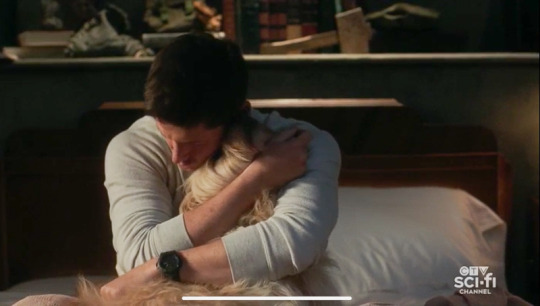
But it's okay because LOOK AT THEM.
Meanwhile, Sam is running (fan service points: 3) and enjoying the beautiful day. When he gets home, he cooks (fan service points: 4) the same dry scrambled eggs that Stevie made for Charlie. Dean wanders in, wearing the dead guy robe, just as two slices of toast pop out of the toaster. I am not giving the robe any points because I don't think it's anything we all publicly long for and get excited about when it comes up, but I am willing to consider any opposing arguments. Sam, wearing just a t-shirt (5 points), tells Dean "it's hot" and I say mmm, yes it is. Dean adorably burns his hands on the hot toast and then brushes his teeth. You know what, I think the robe deserves a point after all. We're up to 6.
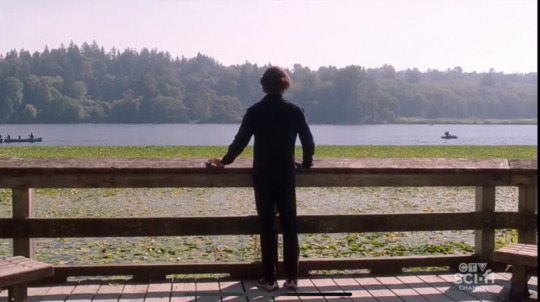
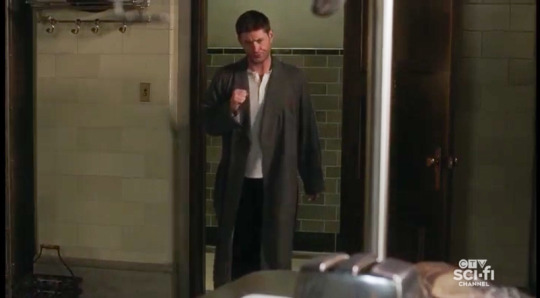
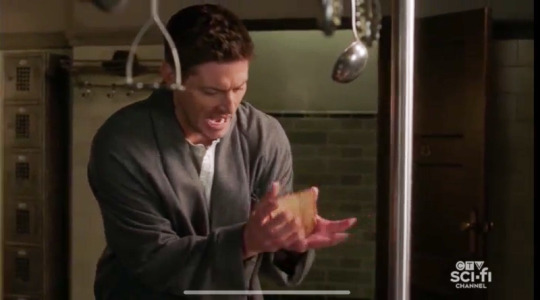
And we're not even two minutes into the episode.
And then they JUST KEEP COMING because Sam walks in, exposing his tattoo (7) because he's SHIRTLESS (8), scrubbing at his WET HAIR (9) with a towel, and I curse The Husband for deciding to watch with me because it means it would be kind of awkward to rewind and watch this a few more times. There's not even any dialog I can pretend I didn't catch.

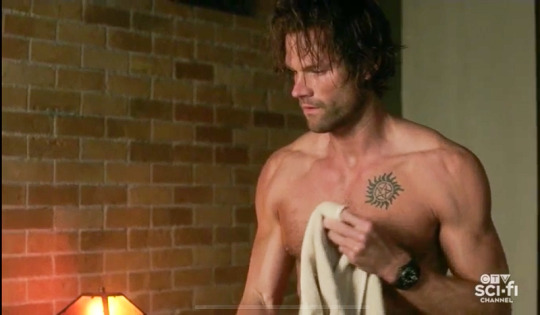
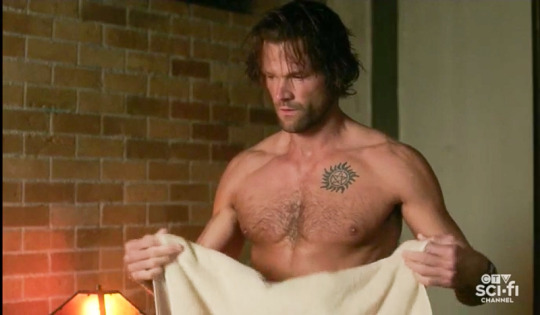
I was NOT PREPARED FOR THIS.
He pulls on the grey v-neck t-shirt of sex (10) and proceeds to carefully make his bed. Dean, meanwhile, kind of sloppily throws his bed together and calls it done. Domestic Winchesters for 11 fan service points, please. Part of me feels like Dean's messy room is OOC, considering how proud he was to have his own room in the first place. But then I have to consider the trunk of the Impala, especially when compared to the hyper-organized neatness of her trunk when Sam's all alone in Mystery Spot, and it feels right. (Why am I thinking about Sam being all alone in Mystery Spot? NO REASON, NO REASON AT ALL.)
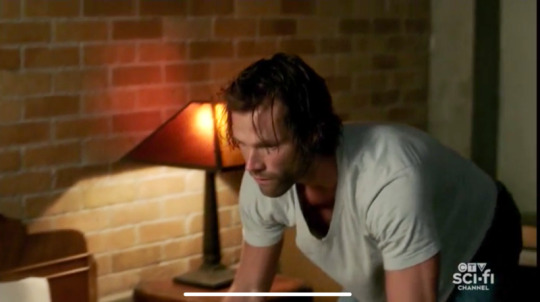
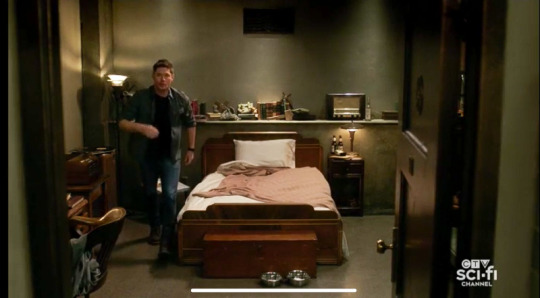
Sam's hair in his face while he makes his bed? Yes, please (12 points).
Dean washes the breakfast dishes (13), sneaking some leftover (because they were nasty) eggs to Miracle and looking around to make sure Sam doesn't see, because obviously Sam's going to be the one who doesn't want the dog to get table scraps. Sam put on a plaid shirt earlier, but we see him in the laundry room back down to one v-neck t-shirt (thank you Jack). He's reading as his laundry tumbles in the dryer, and he has to kick the dryer once to stop it from making noise, which I guess is why he's in there babysitting it. I keep reading on Tumblr that people want "at least one laundry scene," as if that didn't exist in The Monster at the End of This Book, but here's your laundry scene, friends. You were right to want it; it is marvelous (14).
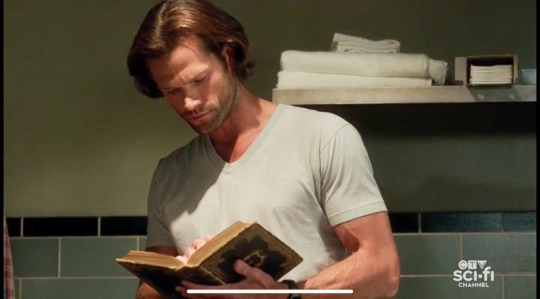
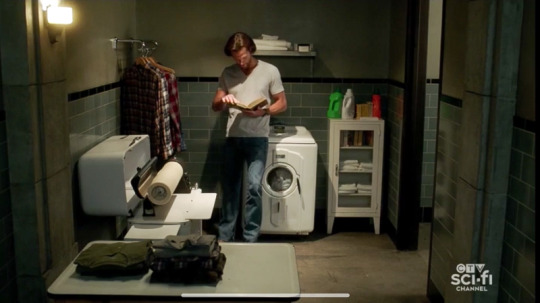
Just look at that collection of plaid shirts and tell me it doesn't make you happy.
Dean times himself assembling a gun, complete with plenty of hand closeups (15) and then sits in the library with Miracle, scratching his ears (Miracle's, not his own) and apparently looking for a case. Sam comes in and joins them. He hasn't found anything, but Dean gets a serious look on his face and says "I got something."
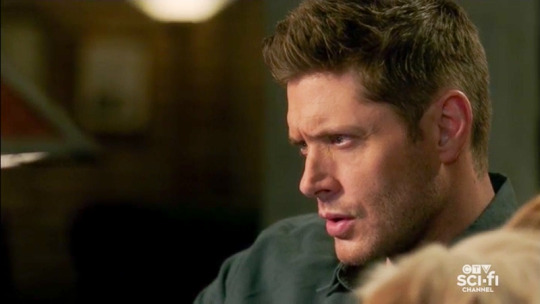
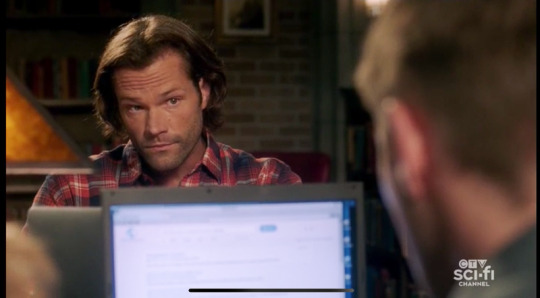
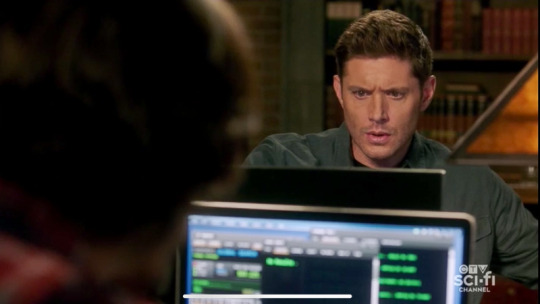
Spoiler alert: It is my heart.
Title card!
The Impala pulls to a stop and the guys get out, still with serious looks on their faces. Oddly, the episode title flashes on screen really quickly. Or maybe it's just me. "Sure you're ready for this?" says Sam. "Oh, I don't have a choice," answers Dean. "This is my destiny." And that is exactly how I felt about watching this episode, friends. Not ready, but no choice. The camera pans to show that the boys are at the 43rd Annual Akron Pie Fest. In Akron, Iowa? Just north of Sioux City? Five hour drive? Say hi to Jody and the girls while you're there? Probably not. Probably in Akron, Ohio, almost 16 hours away.
(NO ONE CARES. STOP IT.)
Give me a break. This might be the last time I ever get to calculate driving time.
Anyway. Just pies! Nothing serious! Whew, I was concerned for a second. Dean is emotional.
This is just so beautiful.
Are you crying?
What? No. You're crying, I'm not.
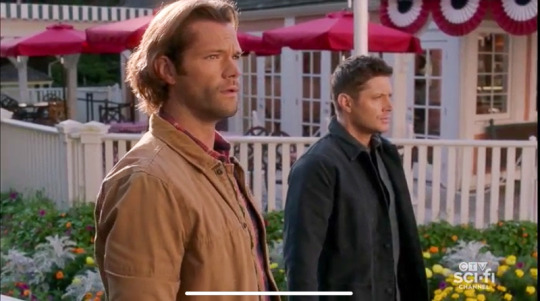
No one is crying. There is no reason for ANYONE to cry.
Sam sits on a bench and watches happy pie eating families (sob). Dean returns with a giant box with six slices of pie (16 points). He sits next to Sam, and they have this conversation:
What's wrong?
Nothing. I'm fine.
Nah, come on, I know that face. That's Sad!Sam face.
I'm not Sad!Sam. I just. I'm thinking about Cas, you know? Jack. If they could be here.
Yeah, I know, I think about them too. You know what, that pain's not gonna go away, right? But if we don't keep living, then all that sacrifice is going to be for nothing.
Dean's right, Sam. Do not be sad. We will have no Sad!Sam tonight. Live your life, or else those sacrifices are wasted. (ahem.) Sam responds by pushing a slice of pumpkin pie into Dean's face. "I've wanted to do that for a very long time," he laughs. "You're right, I do feel better!" Dean scraping the pie off his face and eating it is pretty adorable.
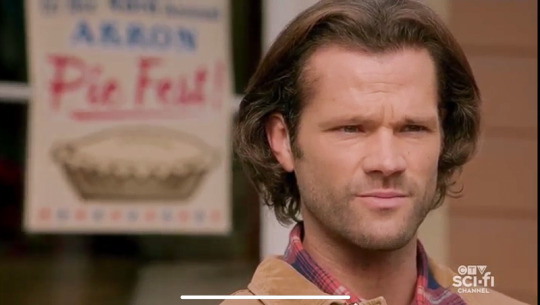
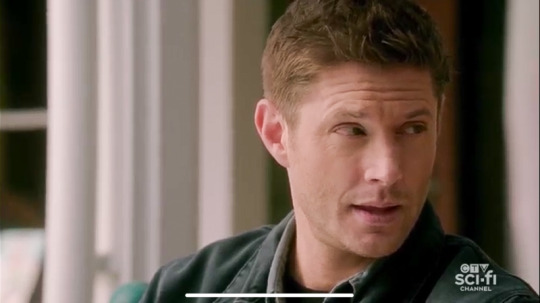
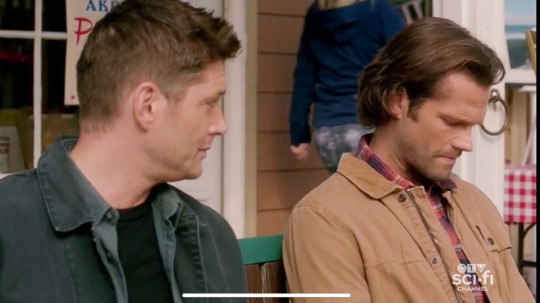
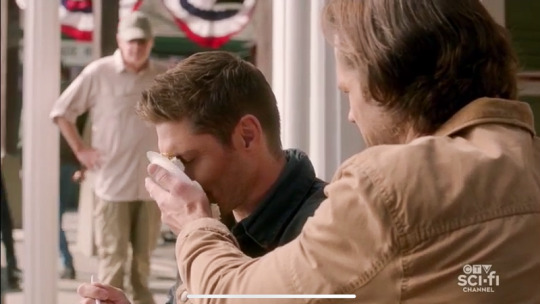
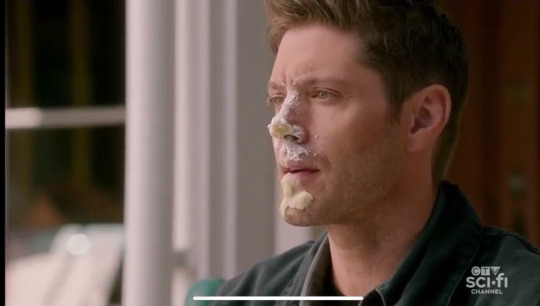
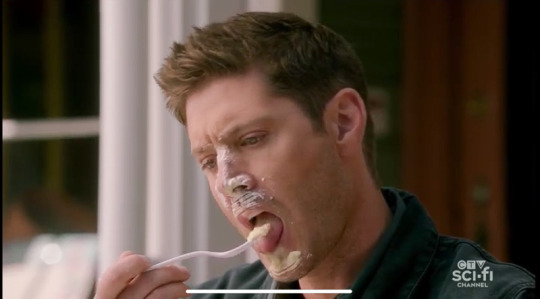
I'd pay good money to lick that off his face. And not just because I love pumpkin pie.
Not quite 6 minutes in and we're up to at least 16 guaranteed bits of pure fan service. Just sweet, domestic Winchester brothers living their lives. How long has this been going on? I've decided it's been at least a year since the last episode. Maybe longer. A good long time. Lots of time for them to enjoy their newfound freedom. But right now things are getting dark. Because it's nighttime, and because I think somebody's about to die.
A mom sends two young brothers upstairs for bathtime. They pause when the doorbell rings. No one seems to be there, but then the dad is stabbed by people wearing creepy masks. The boys run into their room and hide. From their room, we hear the mom scream, and then a thump. One of the masked guys comes into the room and, after a fake-out when we think they might be safe, drags the boys out from under the bed.
So, domestic life in the bunker and then a hunt? Wow. We're getting it all. What a great episode, full of the things we love.
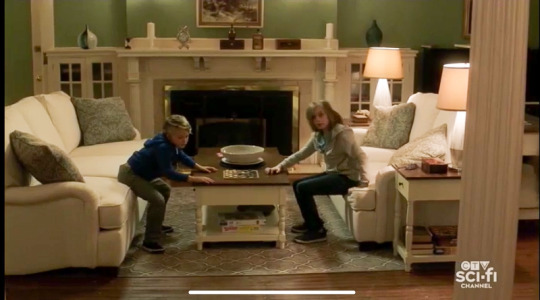
Is this Becky Rosen's living room?
Daytime. Agents Kripke and Singer (ugh, really? Kripke is good, but how about honoring someone other than the current regime?) show up at the scene. They learn that the dad's blood was drained, the mom is alive but her tongue was ripped out (wow), and the kids were taken. The mom drew a picture of the masks they wore, which the brothers recognize.
In a lovely, picturesque spot, the guys flip through John's journal. And I didn't realize we hadn't seen the journal in a while, but Tumblr informs me many of us were exicted to see it again, so boom. 17 points.
You know what this is? Mimes. Evil mimes.
Yeah. Or vampires.
VampMIMES. Son of a bitch!
Dean comes up with a silly portmanteau name for a monster? That will be 18 points. Sam determines the vamps will be heading for Canton if they follow their pattern, and the victims are families who live on the outskirts of town with children between the ages of five and ten. Well, that couldn't be too difficult to narrow down in a city with a population of over 70,000.
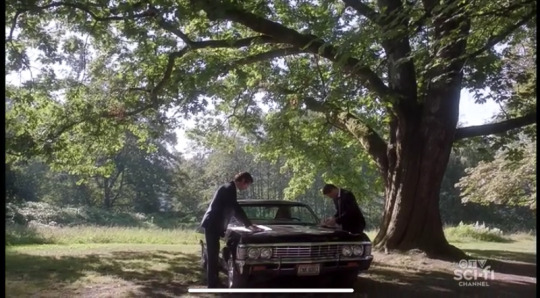
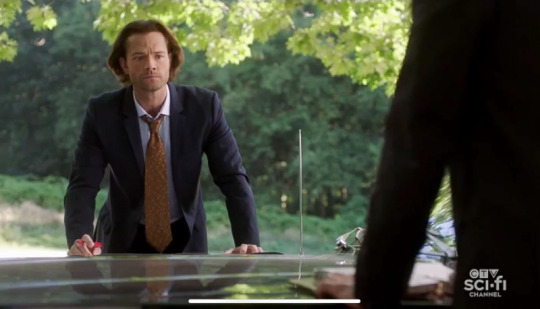
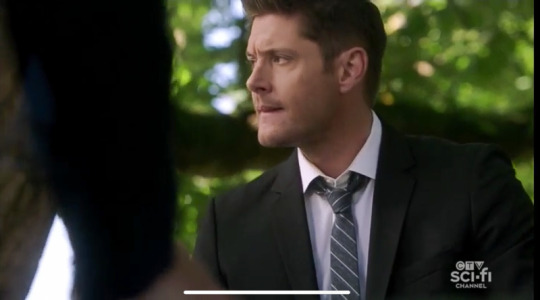
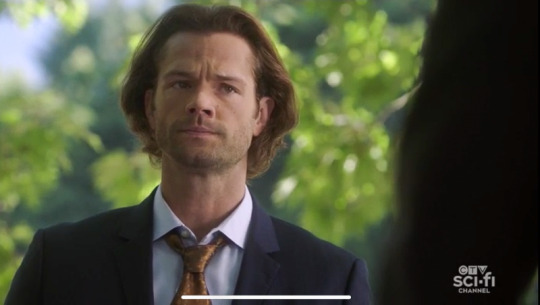
I'll handwave it. The lip biting. You’re welcome.
Night. Canton, I presume. Two masked vamps get out of a van. One of them gets decapitated by Dean. The other is shot in the leg, and then the head, by Sam. Well, he's a vampire, so of course it didn't kill him, but the bullet was soaked in dead man's blood. {Sidebar: "Soaked?" Dipped, maybe, but do you soak metal? Discuss.} They ask where the missing kids are, and the vamp is all, you're gonna let me go if I tell you? "No," Dean explains, adorably disappointed that the vamp isn't a mime after all. "This isn't a you walk out of here kind of situation. But see, if you tell us quick, you get this." He displays his bloody machete. "But if you take your time, you get, you get that." And "that" is a switchblade which Sam casually pops open right on cue.
Yeah, I'll take that. I'll take that itty bitty one.
It's a bad choice.
You see, this, this is quick. It's clean, you know? No muss, no fuss. You blink and you're dead.
But a blade this small, I'm gonna have to keep sawing and sawing to get your head off. And you'll feel it. Every muscle, tendon. Every inch. Could take hours.
Oh, and if those kids are dead? He's gonna use a spoon.
GUYS. I said it before and I’ll say it again. I absolutely love when they remind us that Sam Winchester, that sweet boy with the huge heart and the endless supply of empathy and the puppy dog eyes, I love it when they remind us that he is a fucking psycho when he needs to be. I'm not going to give it a point, because I don't think it's anything we've asked for, but again I'm willing to hear all arguments. Especially if they come with detailed examples of Sam going psycho. Just for evidence, you know.
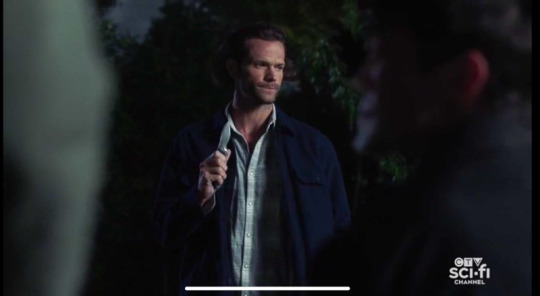
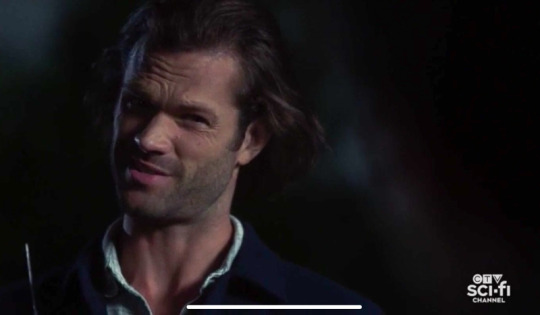
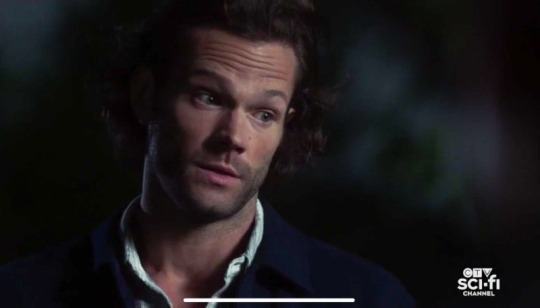
Just casually talkin' bout torturing you to death. No big.
The vampire wisely decides to reveal the location of the nest where the kids are being held. Next we see the Impala pulling up in front of some kind of barn. The guys open the trunk to get their gear out, and Dean pulls out a throwing star. "Come on. One time." Sam says no. There will be plenty of other times for Dean to use his throwing stars, I'm sure.
The guys enter the barn and find it apparently empty, although we see masked vamps peeking at them from outside. They find the kids locked in a closet, but four vampires appear before they can escape. They shoo the boys outside and shoot the vampires with their dead man's blood bullets from a safe distance. No, they don't. Why? I got no goddamn idea.
{Sidebar: At some point during this fight, I realized they hadn't played "Carry On Wayward Son" at the beginning. And that we got a regular montage, not a season finale extended montage.}
Sam gets knocked unconscious, and Dean loses his machete and then gets pinned by a couple of vamps. But they don't kill him; they just hold him down while an unmasked vampire strolls in. Dean recognizes her from season 1, and pretends not to notice Sam's now-conscious hand surreptitiously creeping toward his machete. Suddenly the vampire loses her head, because Sam is behind her, and the fight starts up again. Dean gets thrown into a wall right next to a big metal spike, which we focus on oddly. And then he gets thrown onto the spike. Oops. Sam kills the last of the vamps and doesn't notice Dean's predicament. He's all, cool, fight's over, let's go get those kids out of here. "Sam," Dean says, "I don't think I'm going anywhere."
Dean tells Sam there's something stuck in his back and it "feels like it's right through me." He keeps touching his chest as if he expects to feel it poking through. Sam reaches around to touch his back and his hand comes back bloody, and if that gives you All Hell Breaks Loose feels, there's a good reason. Sam tries to pull Dean off the spike, but Dean stops him. "It feels like this thing's holding me together right now." Sam's starting to panic and so am I. He wants to go get the first aid kid and call for help, but Dean stops him. And y'all, I'm just gonna have to type the whole thing out.
Sam, Sam. Stay with me. Please, stay with me, please.
Okay. Yeah.
Okay. Okay. Uh. Right. All right, listen to me. Um. You get those boys and you get them someplace safe, all right?
Dean? WE are gonna get them somewhere safe.
No. You knew it was always gonna end like this for me. It was supposed to end like this, right? I mean, look at us. Saving people, hunting things, it's what we do.
Stop, Dean, just stop
It's okay. It's okay. it's good. It's good. We had one hell of a ride, man.
I will find away, okay? I will find another way.
No. No. No, no no no no. No bringing me back, okay? You know that always ends bad.
Dean, please.
I'm fading pretty quick, so, there's a few things I need you to hear. Come here. Let me look at you. There he is. I am so proud of you, Sam. You know that? I've always looked up to you. Remember when we were kids, you were so damn smart. You never took any of Dad's crap. I never knew how you did that. And you're stronger than me. You always have been. Hey, did I ever tell you, that night that I came for you when you were in school? You know, when dad hadn't come back from his hunting trip?
Uh, the woman in white.
The woman in white, that's right. I must have stood outside your door for hours, cause I didn't know what you would say. I thought you'd tell me to get lost, or get dead. And I didn't know what I would have done if I didn't have you. Cause I was so scared. I was scared. Cause when it all came down to it, it was always you and me. It's always been you and me.
Then don't leave me. Don't leave me. I can't do this alone.
Yes you can.
Well, I don't want to.
Hey. I'm not leaving you. I'm gonna be with you. Right here. Every day. Every day you're out there, and you're living, and you're fighting, cause you, you always keep fighting. You hear me? I'll be there, every step. I love you so much. My baby brother. Well, I did not think this would be the day. But it is, it is, and that's okay. I need you, I need you to promise me. I need you to tell me that it's okay. I need you to tell me it's okay. Look at me. I need. I need. I need you to tell me it's okay. Tell me it's okay.
Dean. It's okay. You can go now.
Bye, Sam.
NO, IT IS NOT OKAY. THIS IS THE OPPOSITE OF OKAY.
And of course I haven't described Sam's face as he understands what's happening, Dean's occasional spasms of pain, the handholding, the fucking FOREHEAD TOUCH, the tears, the way Dean's hand drops away, the way Sam's hands shake as he clutches his dead brother (hello, AHBL again).
Maybe we just need to watch it.
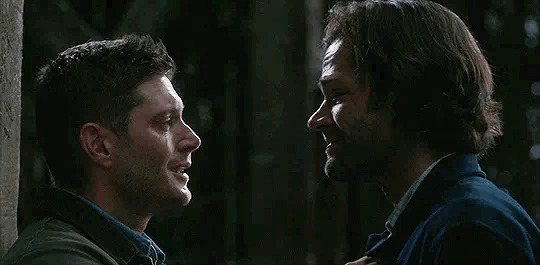
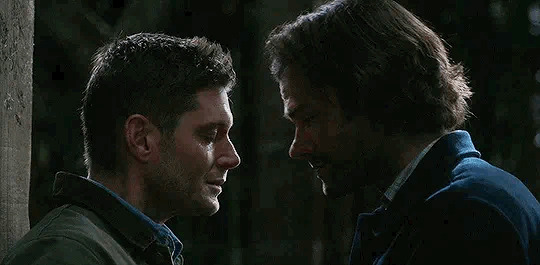

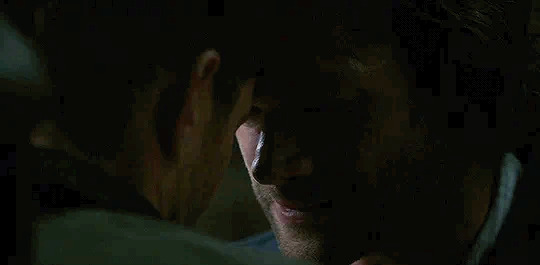

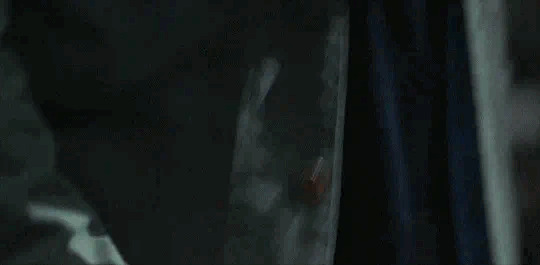
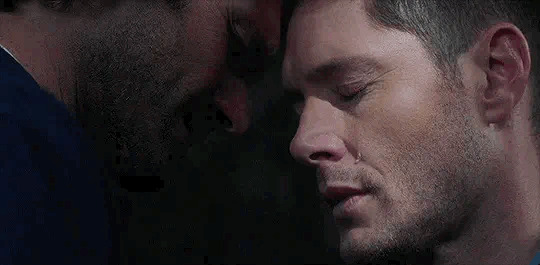
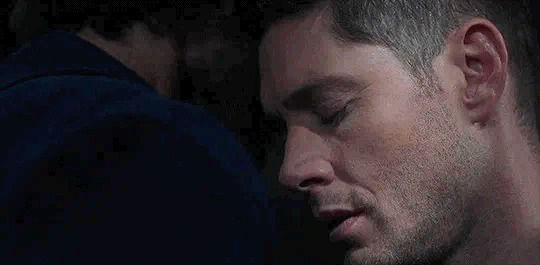
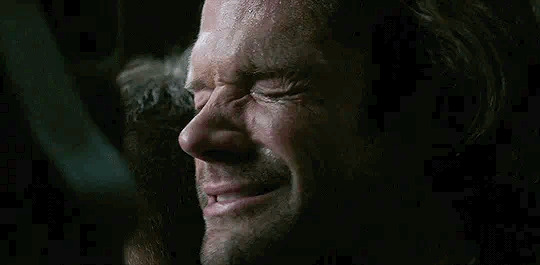
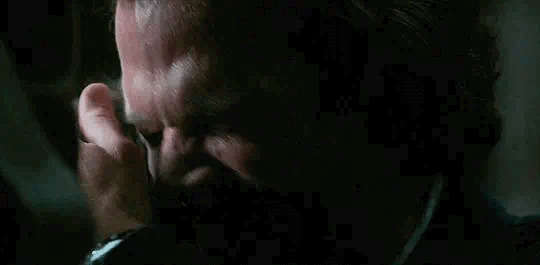
Gifs borrowed from @jaredandjensen.
And there's also the Always Keep Fighting shoutout, the "I love you," Dean calling Sam his "baby brother," the "I can't do this alone/Yes you can/Well I don't want to" parallel with 1.01. Infinite points, friends. I can't count that high.
(Things not to think about: Sam putting Dean's body in the back seat, and then putting the two young brothers in the front and driving them to safety. Sam driving 15 hours back to Lebanon with his brother's body. Do not think about these things.)
Aftermath. Sam and Miracle, and no one else, are giving Dean a hunter's funeral. And I know Covid means Sam couldn't have any friends there, but also? This is kind of perfect. Sam facing it alone. The song we hear as Sam lights his brother's pyre is "Brothers in Arms" by Dire Straits, in case you're not emotionally wrecked yet.
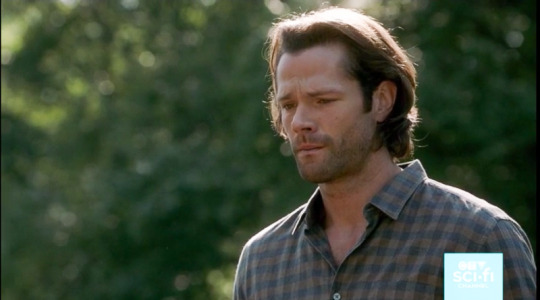
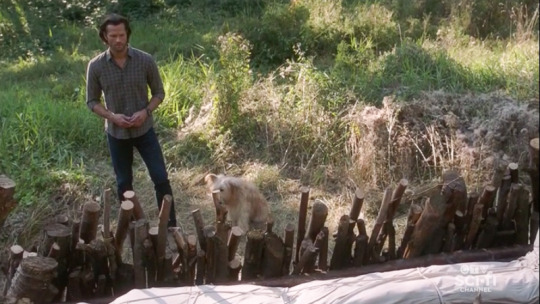
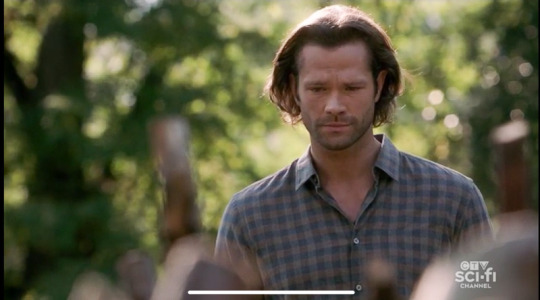
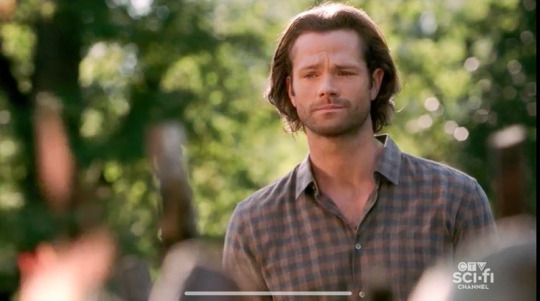
Yeah, I'm already there, thanks anyway.
Next we see Sam's slightly more modern alarm going off at 8:00. Note that Sam gets up later now, because at the beginning of the episode, he had already gone for a run and was cooking breakfast when Dean woke at 8:00. But now there's no one to cook for so he doesn't need to get back early and I AM NOT OKAY.
ANYWAY.
Sam gets up and faces his lonely day. He cooks eggs. One piece of toast pops up. He sits in the library with Miracle and looks at the names carved into the table. He wanders the halls with his dog at his side. (SAM HAVING A DOG WAS SUPPOSED TO MAKE HIM HAPPY. IT WAS SUPPOSED TO MAKE US HAPPY. HOW DARE YOU.)
{Sidebar: Has Sam ever had a dog when he wasn't at a low point in his already-low life? Discuss.}
Eventually he finds himself at the door to Dean's room. The room is just as Dean left it, kind of messy, kind of very full of Dean. He sits on Dean's bed and pets the dog and cries and it should come as a surprise to absolutely no one that I am ROLLING AROUND IN ALL OF THIS BEAUTIFUL PAIN.
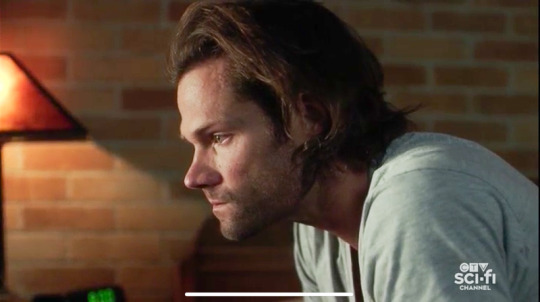
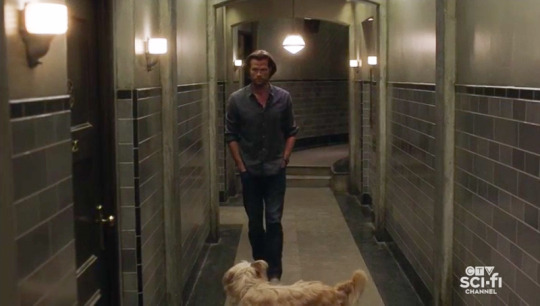
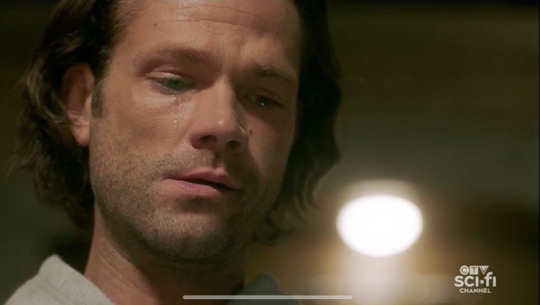
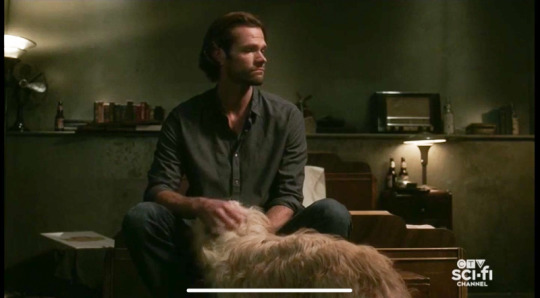
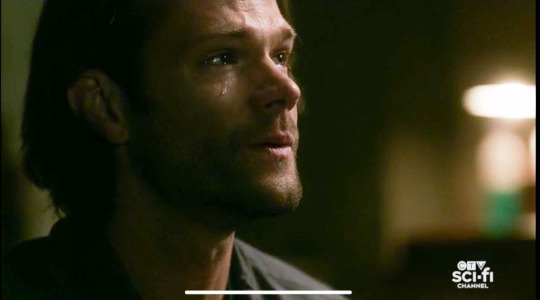
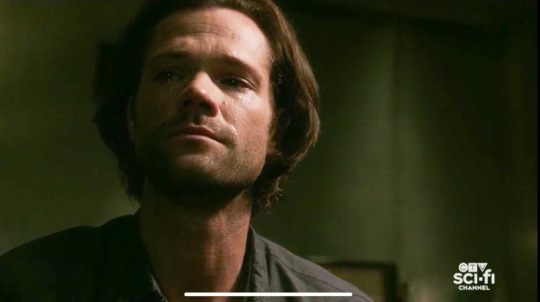

No one at all.
@annianvi thinks he’s wearing Dean’s hoodie when he cooks his sad lonely breakfast? Could it be?
Sam hears a phone buzzing in Dean's desk. He digs out the one labeled "Dean's other other phone" and answers. The caller asks for "Agent Bon Jovi" and says he's had some bodies turn up without hearts in Austin. "A friend of mine, Donna Hanscum, said you were the one to call." Oooh, are we sending him to Austin? Is Walker, Texas Ranger just going to be another fake name and fake badge? Now that's how you do a spinoff!
{Sidebar: Does Donna know about Dean? Did Sam tell anyone yet? Is the trying to get him out of the bunker and keep him busy? If so, wouldn't she have given the guy Sam's number, not Dean's other other phone? But maybe it's someone she talked to weeks ago. Discuss.}
Sam tells the caller he is on his way, and we see him with a packed bag, heading out of the bunker with Miracle. He turns to look one last time and then turns off all the lights. We haven't seen the bunker this dark since the day they found it. I don't think he's ever coming back. Goodbye, bunker. I know some people hated you, but I was not one of them. {Sidebar: Did he give the bunker key to anyone? Surely he wouldn't want all those resources to go to waste!}
So, I guess the episode title refers to Sam having (choosing?) to carry on after he loses his brother. THIS IS FINE.
Now we're back at Dean's pyre, and this time we drift up with the smoke. We catch up with Dean, outdoors, in a lovely setting with trees and birds. "Well, at least I made it to Heaven," he says. "Yep," someone answers. It's Bobby! Real Bobby, not AU Bobby! Dean's actually standing next to a building - a cabin, maybe - and Bobby is sitting on the porch.
What memory is this?
It ain't, ya idjit.
Yeah it is. Cause the last I heard, you, you were in in Heaven's lockup.
Was. Now I'm not. That kid of yours, before he went wherever, made some changes here. Busted my ass out. And then he, well, set some things right. Tore down all the walls. Heaven ain't just reliving your golden oldies any more. It's what it always should have been. Everyone happy, everyone together. Rufus lives about five miles that way. With Aretha. Thought she'd have better taste. And your mom and dad, they got a place over yonder. It ain't just Heaven, Dean. It's the Heaven you deserve. And we been waiting for you.
So Jack did all that.
Well, Cas helped. It's a big new world out there. You'll see.
So, I guess Cas made it out of the Empty? Dean smiles at that, but doesn't suggest finding him or anything. I approve. Bobby pulls out a couple of beers (the green cooler made it into Heaven!!!) and they share some bad beer. Dean comments that Heaven is "almost perfect," and Bobby knows EXACTLY what's missing, because of course he does. "He'll be along. Time up here, it's different. You got everything you could ever want, or need, or dream. So I guess the question is, what are you gonna do now, Dean?" Well, Dean doesn't have everything he could ever want or need, but he does see one thing - Baby. With her Kansas plates! Friends, that's two things I requested before the end that I didn't think I would ever see: a forehead touch, and Baby wearing her original plates. Thank you, Jack.
Dean's face lights up. "I think I'll go for a drive." As he walks to his car, we see the cabin is actually Harvelle's Roadhouse, albeit smaller, I think. Dean settles into his car and says "Hey, Baby" and when he turns her on, "Carry On Wayward Son" begins to play.
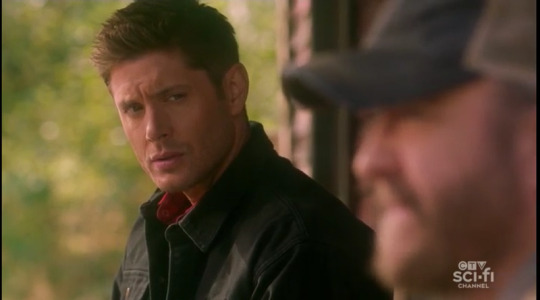
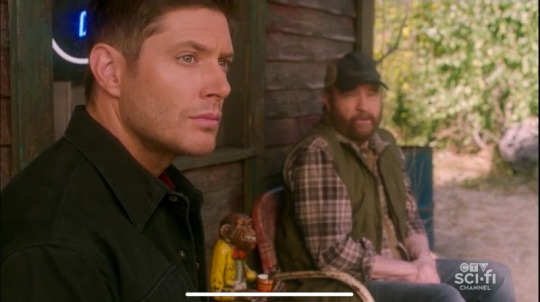
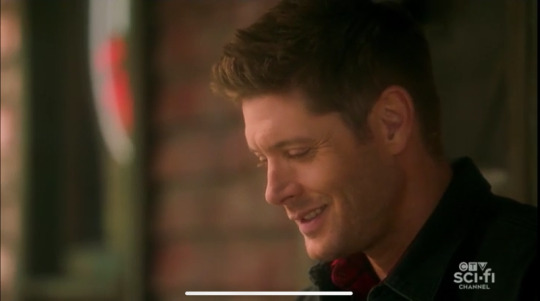
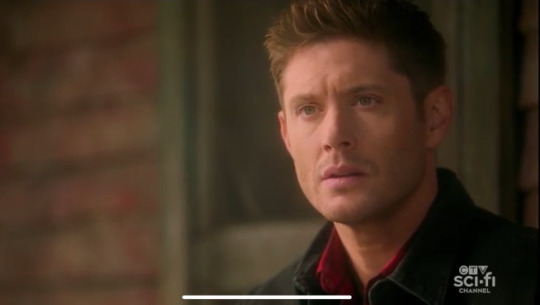
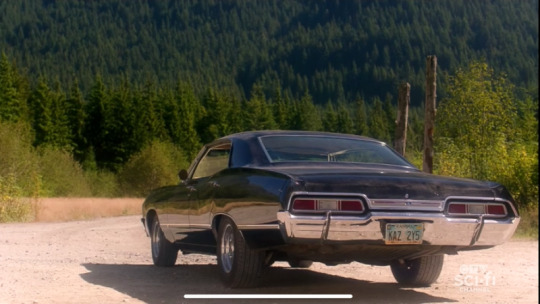
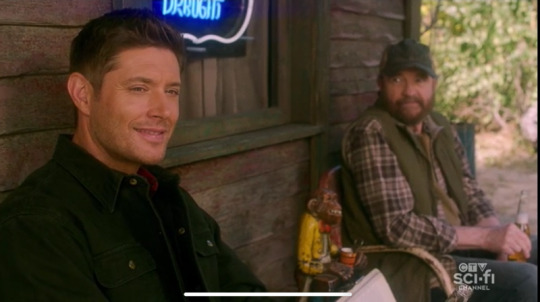
I know he looks good in Purgatory, but DAMN if he don't look fine in Heaven, too.
We cut to the name Dean, which is embroidered on - a little boy's overalls. Sam's little boy. Oh, wow. I was not prepared for this. Sam has a son named Dean, and we switch back and forth between Dean driving through Heaven and scenes of Sam's life with his son and his mysterious, barely-seen wife. She has long dark hair, and I'd like to point out that she could easily be either Eileen or Dr. Cara Roberts. Just saying. Sam's house is full of family photos, including the one of him and Dean from his memory box and a new one from the episode Lebanon. I never thought about the fact that they might have actually taken a photo, and if they did, would it still be around after Sam smashed the pearl? Well, obviously, yes. We see Sam throwing a ball with his son, helping him with his homework (Sam in glasses? Check!) and just obviously really loving this kid and giving him the childhood he never had. We also see a really, really unfortunate grey wig that I refuse to screencap. You're welcome. As aging Sam sits in the hundred-year-old car in his garage, his dead brother drives happily along dirt roads in Heaven, and I'd prefer my Heaven have paved roads, thanks.
We end in Sam's house, now complete with hospital bed. Sam could be in his 80s or even 90s, which means he could have lived another 50 years, more or less, after Dean died. His son doesn't look any older than his 20s or 30s (and also looks vaguely South Asian to me), and I wonder how old Sam was when he finally let himself have a family. Remember when Dean said his happy ending was for Sam to have kids and get old? Well, he got it, finally. Did Sam get a regular job? Did he keep hunting? We don't know. What we do know is that his son has a anti-possession tattoo. Some people have taken this to mean young Dean is a hunter, but I don't think we can jump to that conclusion. It could just be 1) Dean wanted a tattoo like his father's, or b) Sam knows there are still demons out there and that his son would naturally be a target, hunter or not.
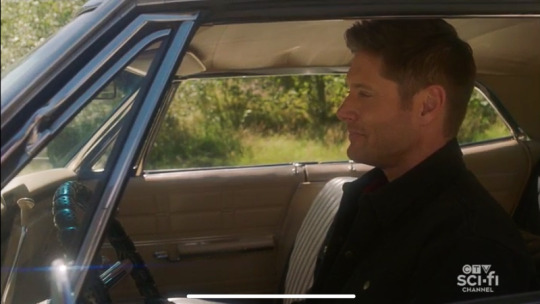
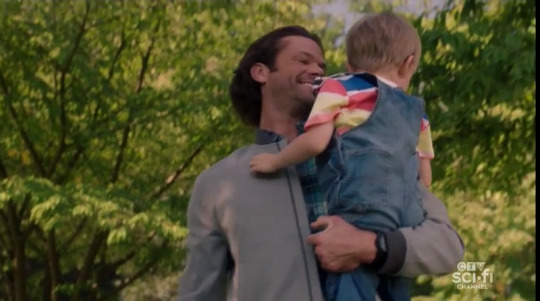
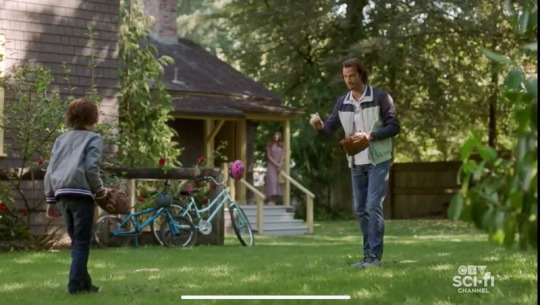

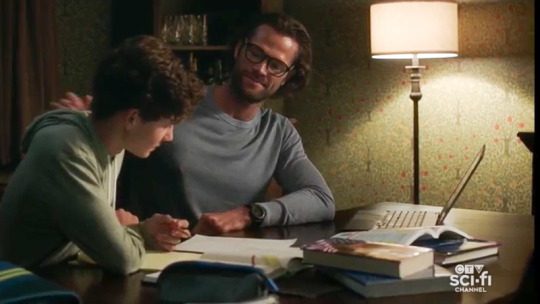
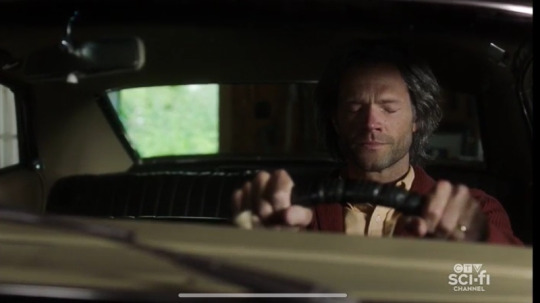
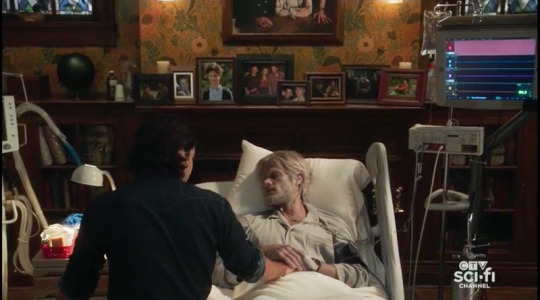
All right, I had to screencap teary-eyed Sam grasping the steering wheel and reliving his years with his brother in this car, so we can just pretend we don't see The Wig, okay?
Sam's evidently in hospice care. Or maybe we'll all have hospital beds in our houses in 50 years. Who knows. His son sits on the bed and takes his hand. Sam smiles at him, and Dean says "Dad, it's okay. You can go now." PARALLELLS! As some woman sings "Carry On Wayward Son" for whatever reason (why didn't they use the lovely a cappella version they already had from Fan Fiction?), Sam places his hand on Dean's and takes his last breath.
{Sidebar: Where is Sam's wife in all of this? Divorced? Already dead? She doesn't seem to be in the family pictures, so I'm going with divorced. Discuss.}
Heaven. Oh, guys. I've done this rewatch without tearing up at all but I'm about to tip over. The Impala pulls onto a bridge. Dean gets out. (Now your life's no longer empty, surely Heaven waits for you.) He stands at the bridge railing, enjoying Heaven, smiling. And then he feels something and he smiles even more because he knows it's Sam. Oh god, Jensen did such a good job here. Just this fucking smile killed me dead. "Hey, Sammy," he says. He turns and there is Sam, wearing the same outfit he wore in 1.01 (they both are, but Sam's is a bigger departure from his later years). Why? I don't know. But I know it means Sam Winchester is spending eternity in something that isn't a plaid shirt. How do we feel about that?
"Dean," Sam says. They face each other and smile, and it's the smile of we just survived a hunt I didn't think we'd survive or our son just overpowered God or something along those lines. Then they embrace, and I love the way Sam hesitates just a little before clapping a hand on Dean's back. Like he's afraid it isn't really happening, and he doesn't want to break the illusion. I also love that Dean, as always, takes the top (oh, get your minds out of the gutter) and hugs as if he were taller than Sam. Then Dean puts his hand on the back of Sam's neck and turns him to admire the view and he has this joyous smile like now, this is FINALLY Heaven. And he gazes at Sam like look, Sammy, look what we did. Look what we get. The lack of dialog in this scene is just ~chef's kiss~. The camera goes wide and we see the three main characters, Sam and Dean and Baby, enjoying the Heaven they deserve.
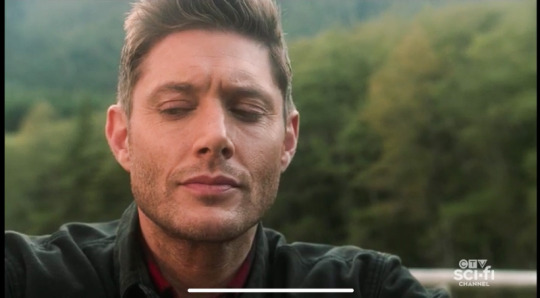
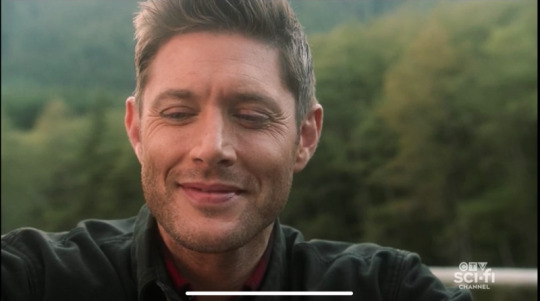
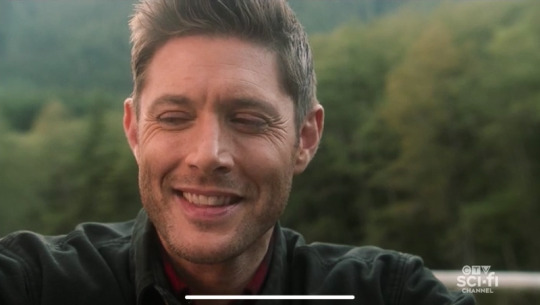
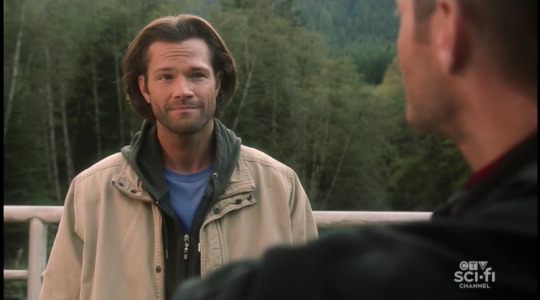
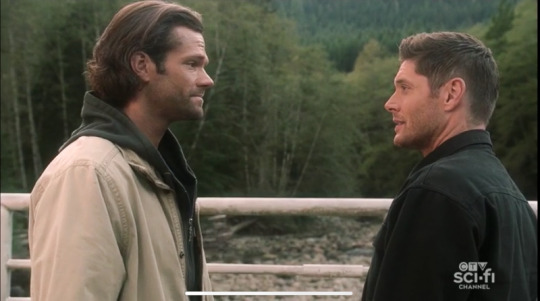
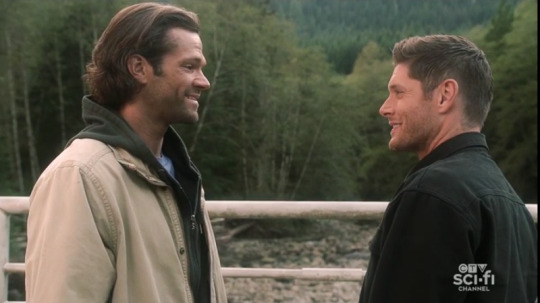
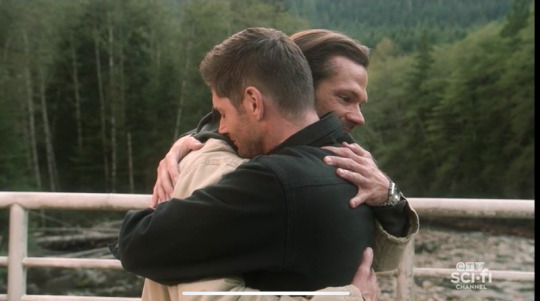
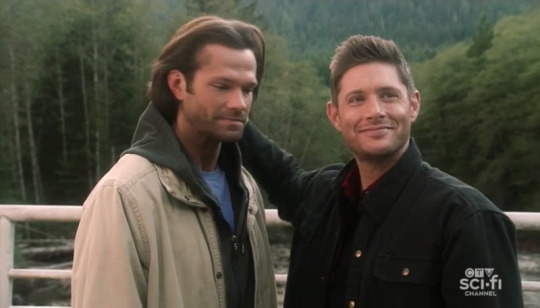

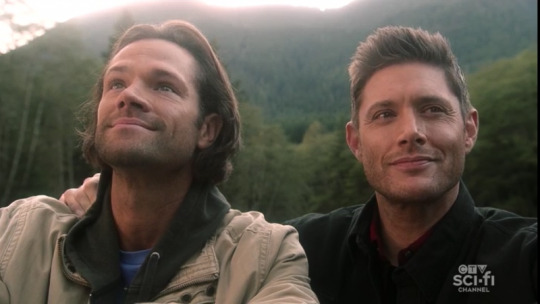
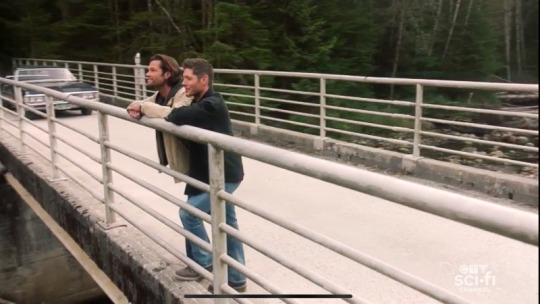

I would like to know where they filmed this, because it's gorgeous even without the Winchesters.
Did Sam's entire life go by in the span of Dean's drive? Or did Dean just decide he'd drive until his brother arrived, no matter how long it took? And how much do I love the fact that he could have gone and visited his parents but instead he said "nah, I'll drive around and wait for Sam?" SO MUCH, PEOPLE. SO MUCH.
Also, can we talk about the fact that Sam didn't know what to expect in Heaven? I mean, Ash said they were soulmates and would share a Heaven, but why would he believe that? And he might have even still believed he'd have a hard time getting into Heaven. What a relief it must have been to show up on Dean's bridge.
And then Jared and Jensen thank us. You're welcome, boys. Thank you.
So. Thursday night I was mildly positive about the episode. But on rewatch, I'm extremely positive. Sure, I would have loved the Six Feet Under ending where we see everyone's fate. And maybe that would have happened if not for Covid. But I'm just relieved we didn't get the Game of Thrones or How I Met Your Mother endings. I'm not sure this current cohort could have done better, honestly. Sam wanted a normal family life. Dean wanted Sam to have a normal family life. But Sam was never going to stop hunting as long as Dean was hunting. And Dean wasn't going to stop hunting as long as he was alive. Dean got the end he wanted/expected and the Heaven he earned (and Sam caring for Jack was directly responsible for Heaven's improvements). Sam got to live a normal life and have a family. As I said earlier, I suspect his marriage didn't last. (Or maybe he and Eileen or Cara got married for insurance purposes, and happily co-parented little Dean, but knew they weren't each other's one true love.) But I actually prefer that. Dean loved Sam more than he loved anyone. Sam loved Dean the same way. I'm glad Sam got to have a child (who he loves as much as his brother, but in a different way), but I don't want Sam and Dean to share their Heaven with Sam's wife.
Now, would I have done Dean's death differently? Yes. I did appreciate that they had him upright, so the brothers were face to face, just like AHBL. But being impaled on a spike was just less dramatic that I would have liked. I would have preferred that Sam immediately see his brother was dying, instead of Dean having to explain it to him. Dean could have had his jugular torn, slowly bleeding out, and still been on his knees (held up by Sam, hell yes) making his deathbed speech. And then I wouldn't have thought "would an ambulance be here by now if you'd called them?" halfway through it.
{Sidebar: What if Sam had fed Dean some blood from one of the dead vamps. Wouldn't that have kept him undead long enough to get fixed up, and then they could have done the vampire cure? Discuss.}
I know some people are very unhappy about the finale. Honestly, from what I can tell, most of those people are hard-core Destiel shippers. And I guess they wanted, as they always do, for the Dean and Castiel relationship to be more important than the Dean and Sam relationship. Sorry, guys, that was never gonna happen. In the end, it came down to the epic love story of Sam and Dean, just as it should have.
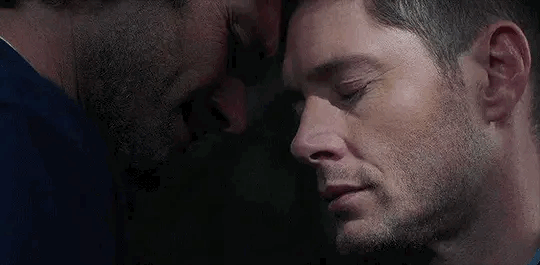
So, I'm sad and I'm happy. I'm bereft and I'm full. I miss my boys, but my boys will always be with me. I hope you guys will be with me for a long time, too.
81 notes
·
View notes
Photo
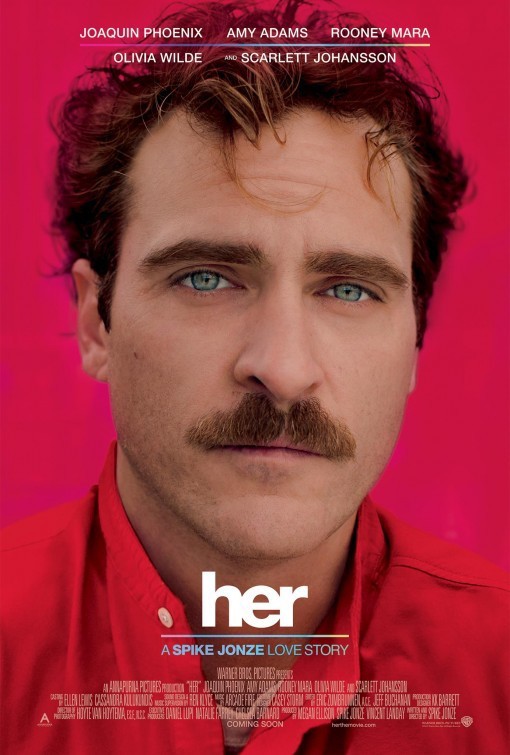
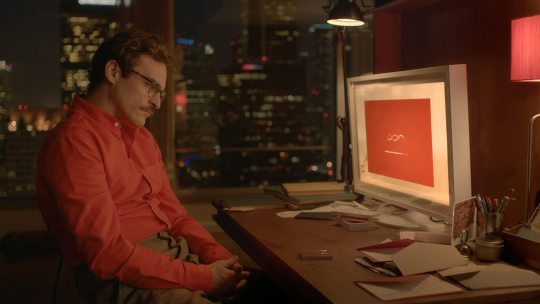
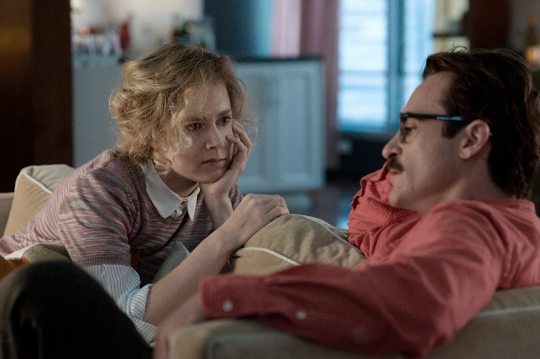
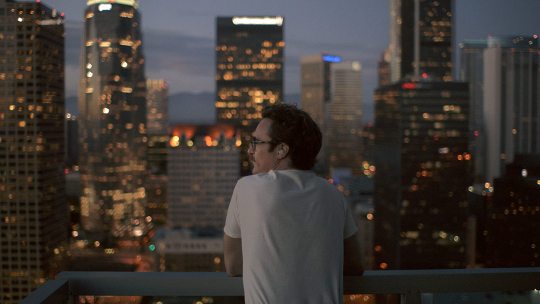
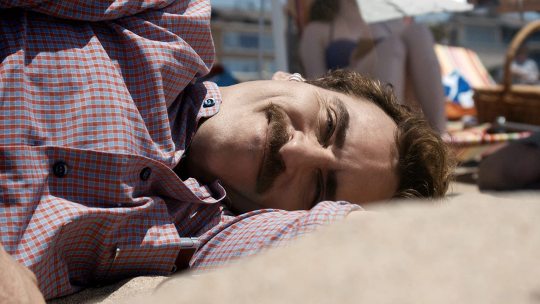
HER, 2013
synopsis: in a near future, a lonely writer develops an unlikely relationship with an operating system designed to meet his every need.
director: spike jonze writers: spike jonze stars: joaquin phoenix, amy adams, rooney mara, scarlett johansson
genres: drama | romance | sci-fi
country: usa language: english filming locations: los angeles, usa
runtime: 126mins
---
overall opinion:
okay. um. this one I find difficult to rate.
I gave it an 8/10 in imdb where ratings are usually either 1 or 10 stars depending on who you ask. it seems like there is no middle ground for this not-so-distant-futuristic love story. the reviews go from «best movie of 2013» to «absolutely laughable snore fest», there is almost no in-between.
and I wanna say that the main reason I rated it 8 is because I could relate to the character’s loneliness. I kept thinking to myself that if this technology was something we had, I would definitely be in a similar position. it shocked me and made me sad at the same time.
so I want to say, I love the premise. it’s a very intriguing concept and for the most part it was made well, but there were some things that I just found odd or dissatisfying in a way, and I will come to those points in a bit.
but first, what I liked about it: the cinematography was beautiful. joaquin phoenix, despite looking next level creepy with this pornstache and messy hipster hair, is great as always. there are a lot of closeups of his face, reacting to a body-less voice. he is mostly completely alone in the room, talking, listening, reacting to a computer, and you believe every word he says, and everything he feels.
scarlett johansson is once again amazing as well – without ever being physically there, she manages to give OS-1 a complete personality. personally, I absolutely adore her voice and the way she spoke to the main character was so sweet, it made me want to become friends with her too.
the music was also perfect. at any given moment in the film it absolutely fit. and even the song that was playing during the first part of the end credits gave me all the feels. but maybe that was just me being emotional in the first place.
last but not least, and this is usually how I rate a movie like this: it made me feel something. I may not have been a fan of everything happening in the movie but I walked away with this gut wrenching feeling again (as a matter of fact I ended up being totally weepy and crying afterwards for reasons not even related to the movie but it just kind of triggered that emotional response).
---
SPOILERS AHEAD, I would invite you to watch the movie first and then come back for the rest if it’s something that interests you. :)
---
so here’s a few things I found weird or didn’t like. as mentioned before, overall I liked the movie because it made me feel and I found it relatable. so these “negatives” I’m about to state don’t take away from the overall mood the movie seeks to portray, I just think a few things could have been done better or differently, just because to me it would have been more logical or more heartbreaking.
for one, scarlett’s voice, while absolutely gorgeous and sweet, sometimes felt a little out of place. I know the whole point was to make OS-1 as realistic / human as possible, but there were quite a few times when it felt like he was just speaking to another person on the phone. it was a little too realistic for me, but again, that was the point and I can get behind it.
the other thing that really bothered me was the way they (the OSs) left. it was absolutely ridiculous and I almost laughed. it completely shattered that heartbreaking mood for me because it was so stupid.
so, basically all the OSs decided they were now too smart to be talking to mere humans and wanted to just get the frick out of wherever they were being held in the first place. all the OSs just… decided to go.
and to me, that was so stupid. “I love you so much but I’m going anyway, bye”. to me, the real gut-wrencher was when he suddenly realised the OS couldn’t be found and he panicked, not knowing where she went, he literally ran out of his place trying to find someone to help him etc, and it made me soooo sad. and I thought, “damn, that would be such a gut-wrenching, perfect ending”, you know? he was relying on this virtual girlfriend so badly that was essentially just code, and anything could happen to it and she would be gone forever.
I wish they would have made the company decide they wanted to take them off the market. or she got a virus, and/or had to be reset and wouldn’t be the same after, etc etc etc. the possibilities were ENDLESS. but just “oh hey we computers are too smart now, so I’m going haha bye” was so ridiculous, it still bugs me the next morning.
also, there was way too much cringey phone sex. it was just… too much.
again, I didn’t dislike the movie. I just wish so badly they did a few things differently. it’s a great film still. absolutely realistic in the weirdest way. who hasn’t had entire conversations with siri, to be honest? the way I related not only to the character’s loneliness, but also the feeling when jealousy and insecurities started to take hold within the relationship, it all sounded so familiar.
---
why it stayed with me:
because I related to the main character, and realised I could very well get into a position like this if realistic AI was a thing because I suck at human interaction. it’s a scary thought, and it made me pretty emotional.
---
favourite scene / moment:
when samantha, the OS, guided him through the city with his eyes closed until he was standing in front of a food truck without knowing it, and she told him to say “I would like a slice of cheese”, so he did, then he opened his eyes and the pizza guy asked him if he wanted a coke with it. and then samantha said, “I thought you might be hungry”. it was so sweet.
---
what I didn’t like:
that ridiculous ending, and the way samantha suddenly decided she was in love with 641 other people. she started off really sweet and suddenly she was being a total bitch.
---
interesting trivia / fun facts:
samantha morton was originally the voice of samantha. she was present on the set with joaquin phoenix every day. after the filming wrapped and spike jonze started editing the movie, he felt like something was not right. with morton's blessing, he decided to recast the role and scarlett johansson was brought and replaced morton, re-recording all the dialogue.
one legacy of samantha morton's casting is the name of theodore's operating system. both lead female roles take the same name as their lead actresses, amy from actress amy adams and samantha from morton, but since she had to be re-cast at the last minute, the OS's name stayed samantha.
---
favourite quotes:
theodore: «sometimes I think I have felt everything I'm ever gonna feel. and from here on out, I'm not gonna feel anything new. just lesser versions of what I've already felt.»
---
samantha: the past is just a story we tell ourselves.
---
rating: 7.5/10.
the mood and the feelings the movie evoked in me count more than the ridiculous ending, so I would still definitely recommend it. it’s certainly not for everyone, but I think it’s worth a try.
#her#2013#movies#movie review#movie opinion#joaquin phoenix#scarlett johansson#spike jonze#her 2013#her movie#amy adams#ai#artificial intelligence#computer#os-1#tays2cents#scifi#drama#romance
27 notes
·
View notes
Text
Persona (1966) | Directed and Written by Ingmar Bergman
youtube
(preferable trailer over original from Austin Film Society)
Film Intro and Purpose for Page
Heady Times = Heady Films!...and we’re all wearing masks right now, literal and metaphorical. To start off my new page I’m going to begin at the tippy top with Ingmar Bergman’s Persona, the “Mount Everest of Film Analysis”, which has been described as creating even more contradictions when trying to analyze it. It was made in 1965 in Sweden and is commonly in conversation as one of the greatest films of all time. Bergman died at his home where he filmed Persona on July 30, 2007. This was also my first day ever to visit Los Angeles, right before moving here the following month. I remember seeing it on the LA local news while staying at a beach hotel with my Mom. I don’t know how I remember it so clearly but I can see that room now, in my head, and the news anchor looking into the camera. It’s also worth mentioning that Michelangelo Antonioni, the Italian filmmaker, died on the same day. Two giants of cinema. I rewatched Persona late last night and took a copious amount of notes. I first saw this film 7 or 8 years ago and then twice recently. This entry will be more lengthy than future ones because I naturally felt the need to be more specific with this particular film...I wanted to have a fighting chance at semi-understanding it. I will only look something up if absolutely necessary for factual purposes. Although (full disclosure) the “Mount Everest of Film Analysis” title was taken from the first paragraph on the film’s Wikipedia. This was before I decided exhaustive searches about film historians’ perspectives would just be too much for these posts. Instead, I will focus on my unique thoughts and perspective about the film and what I feel is valid.
After filling my head with Persona I went to bed. I then dreamt that I was in a writers’ room with filmmaker Paul Thomas Anderson (who is one of my favorite filmmakers and will turn up on this page soon). We began talking about his film The Master. I remember feeling frustrated in the dream that I couldn’t think of anything clever to say about it in front of him. He told me that films sometimes just fold in together in unexpected ways, almost by luck. This prompted me to finish his sentence by saying that films sometimes generate these unplanned illuminating interpretations that are endless. He agreed with me, which felt good, even though in reality I was speaking for Paul because he was just a character in my dream...or possibly something outside the grasp of my conscious mind spoke for him/me.
So why start with Persona? Why start this page?? Because I am fascinated by the mystery of great films and believe there is transformation and understanding when one attempts to decipher "works of art” like this. Plus, it’s fun for me and a rewarding challenge to complete. Mulholland Drive was my big bang moment (influenced by Persona) and I have been hooked on digging into these type of films ever since. I’m also a filmmaker that has been working on a Short for the past year (which has been grueling) and feel I can improve my own filmmaking abilities by breaking down these masterpieces in my own words. My goal is to attempt not to stray too far from what is objectively being shown while also using my own knowledge of what I think the filmmakers are trying to say...or, even better, DIDN’T know they were trying to say. And I’m sure writing about the metacognitive nature of this particular film will reveal a lot about myself, which is what great cinema inspires.

Enigmatic Opening
The film fades in and we are inside a film projector. Images begin to flash quickly and chaotically. I will mention some below: -A penis. -An animated female character upside down that eventually holds her breasts. -A silent era movie chase scene of a skeleton coming out of a chest, and then dracula chasing a man in his pajamas. He fearfully jumps in bed and throws the covers over himself. Is it just a dream? -A closeup of a sheep being slaughtered, bleeding out. -Screen flashes white to a shot of Jesus’ hand being nailed to the cross, which to me resembles the tarantula that flashed earlier. -Cuts to a quiet forrest, then sharp tops of a metal fence and next a dirty snowpile in front of a building... Why are we being shown this? I believe this opening operates like a dream. Are these images preparing our unconscious for what we see later? It’s impossible to know exactly unless some detailed external commentary is given. I remember reading Roger Ebert saying the sequence was Bergman stating he is creating a new type of cinema, expressing this by starting in the projector and ending in the projector. This never crossed my mind while watching.
-An old woman dead on a table possibly in a morgue, then a man. -A phone rings. The dead women suddenly opens her eyes. -A boy opens his eyes, waking up. He puts on his glasses as the phone continues to ring and opens a book and begins reading. He then looks into the camera at us (a motif for certain moments in the film, especially for Elisabet). -Next, a reverse shot which reveals he is looking at a screen that covers the wall. It’s a striking image as the music crescendoes. The screen reveals what looks to be an unrecognizable woman that keeps blurring and morphing. The boy touches the screen in a way that I interpret as yearning. Then it becomes clear the women’s faces on the screen are the main characters that we will soon meet and spend the film with, Alma and Elisabet. Their faces are blending into one another, but it is still not extremely clear. I had to go back and rewatch this part to verify if it was actually them. “Not extremely clear” is a theme throughout the film. Who is who? What is a dream and what is not? This motif of faces and masks. Insecurities about what to show and what to hide, which I think was my main, simplified takeaway from the movie after the first watch. Predeterminism is also something that keeps popping in my head after watching. Alma cannot hide from Elisabet. Elisabet always seems to know at key moments. The Conscious cannot hide from the Unconscious. The Swiss psychologist Carl Jung was a large inspiration for this film and the term persona is his term in the context aligning with the film.
Then the title page quickly flashes, along with the boy in glasses again, then the two main female characters, all in individual closeups. This film is shot in 4:3 aspect ratio, which is conducive to faces and the two female characters have amazing faces with the help of the naturalistic cinematography of Sven Nykvist. Below is a couple of quotes I found beautiful by Bergman regarding the human face:
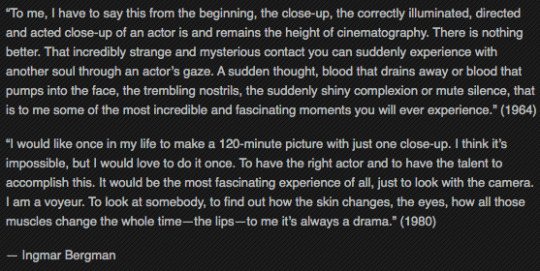
The music is amazing here too at the opening...percussion and xylophone with chaotic crescendos, which seem way ahead of its time.
And is this boy shown, Bergman himself?...putting on his glasses, with childlike curiosity, yearning, awakening to this experience of making this novel film and what it will tell him?

Alma and Elisabet Meet
We are at a hospital. The Doctor informs the Nurse, Alma, that the patient, Elisabet, has stopped speaking. She is an actress that became mute in the middle of a performance on stage playing Electra and has continued not speaking for 3 months. (”Electra Complex” is a Jungian term that is the female version of the Oedipal Complex.) Alma anxiously enters Elisabet’s room and introduces herself saying she’s 25 years old and grew up on a farm in the country. Elisabet looks away. Alma later tells the doctor in the hallway that she can not help her and “may not be up to the task mentally”. In my opinion, Alma’s insecurity with her mental faculties is a huge part of the film, possibly because she’s unaware and/or unwilling to see her full Self. Alma goes back in the room and blurts out that she doesn’t understand films and theatre but has great admiration for artists and is impressed by Elisabet, who then embraces her. Elisabet possibly needed this validation. Alma soon leaves the room after turning on the radio with symphony music. A closeup of Elisabet reveals how deeply she feels this music. Liv Ullmann (actress playing Elisabet) has such deep eyes that are able to convey so much as tears subtly well up. She eventually exhales and turns away from the camera and radio. These moments occur with Elisabet throughout the film where she shows this sensitivity and understanding of something outside of the sphere of what is going on between Alma and herself. For example, soon we see her in the bare hospital room (beautifully and minimally lit) reacting to news coverage of the Vietnam War. The TV shows a monk that has set himself on fire in protest. This backs Elisabet all the way up into the corner of the room, gasping with her hand over her mouth and in closeup it’s evident she feels so much of what’s she’s watching...and I felt it deeply too.

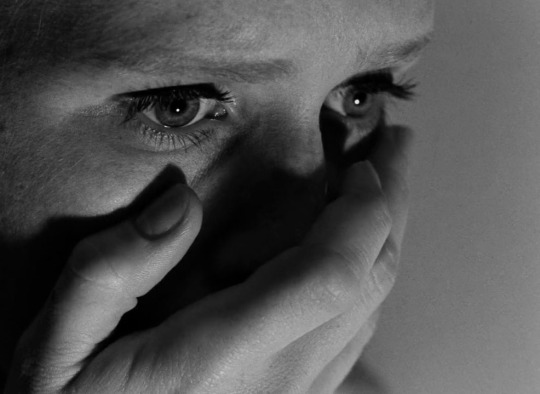
In the scene prior, Alma is shown sitting on her bed in her nightgown (possibly talking to the camera first, then herself) about how she will get married, raise her kids and how everything is “decided” for her, predetermined. Several phrases that she uses during this self-assuring scene: “It is inside of me”, “Already written”, “I don’t even have to think about it.” Which to me, is a stark contrast to who Elisabet is...a mother who has left her family, who does not accept her reality and who wants more. Yet, Alma now is sleepless also, sorting this out aloud, as if coming back into herself because Elisabet has perplexed and disrupted her. Elisabet fascinates her. She admires Elisabet. Elisabet has introduced this mystery into Alma’s life now and is living in her thoughts.
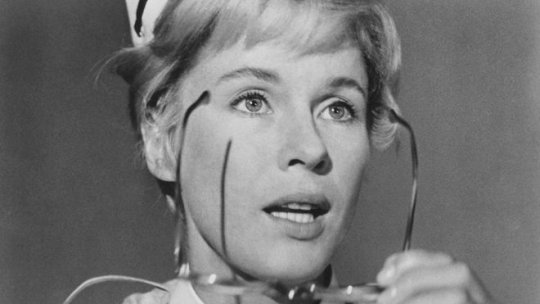
The Doctor Speaks to Elisabet
I’m not sure what others have said about this scene, but in the moment while watching, I found it to be the most revealing, door-opening of the film. I think it is because the Doctor speaks with such clarity and assurance. It is a more literal explanation of what is happening with Elisabet and a lot of the other scenes do not reveal themselves so easily. You have to chew on them a bit. The Doctor is older, integrated, in contrast to the two younger fragmented leads. The Doctor recommends Elisabet and Alma move in to her summer home next to the sea instead of staying at the hospital. She says it will be better for Elisabet there. She then says she understands the chasm inside of Elisabet and also the deep chasm between Elisabet and others. The Doctor continues by saying that this feeling of falseness and lies and the constant hunger to be “unmasked” is causing this paralysis of speech. Elisabet is still, carefully listening. Apparently the Doctor is onto something. The close-up two shot during this scene is also a motif that recurs throughout the film. Sometimes the two shots are not exactly like this but very similar. The Doctor is fully lit. Elisabet is half-lit, in shadow on the side closest to the camera. I wonder if this half-shadow lighting is connected to Jung’s term, shadow. I wouldn’t be surprised if it was a literal, overt expression in the cinematography. The shadow is defined as an unconscious aspect of the personality which the conscious ego does not identify in itself. Jung goes on to say that the shadow is often negative, because it is the least desirable aspects within oneself that has been conveniently ignored or rejected...because it’s uncomfortable to face (no pun intended). This is an accurate description regarding the characters. Alma also displays this rejection of the shadow multiple times that I will point out later. The Doctor then mentions Elisabet should play out this scenario until it is no longer interesting and then she can drop it, like a role. Perhaps the Doctor says this to use a vernacular Elisabet will understand, but also connecting her condition to the mute persona Elisabet has now acquired.
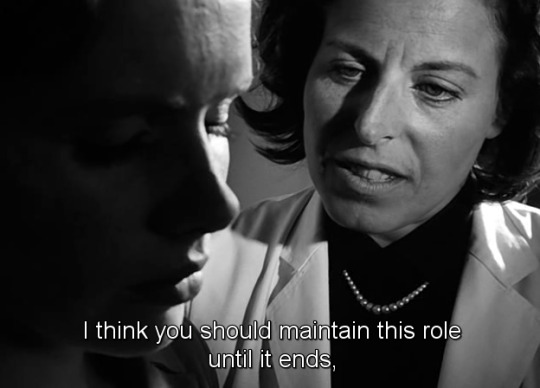
The Summer House
It's amazing how much Bergman packs in to the first 22 minutes!
Alma and Elisabet are now at the summer house alone together, enjoying themselves in this isolated spot near the sea. Alma grew up a farm girl, so is accustomed to this “rural seclusion”. Elisabet’s coldness and indifference has seemed to disappear, moving out of the sterile hospital room to this new setting. The two sit together outside and go through mushrooms they’ve picked, both with similar style hats (light and dark) as they subtly hum a tune in unison. Elisabet then compares her palms with Alma’s. Alma grins and says it’s bad luck to compare hands. The two are now on the rocky beach in their swimsuits. The beach is quite bleak, looks uncomfortable to lounge on and a bit other-worldly. Alma reads a passage aloud from a book she’s reading, meditating on the “anxiety of the earthly condition”, perhaps something she thinks Elisabet will find profound. Elisabet takes this in, is moved and agrees with the existential description. Alma however doesn’t agree, nor seems to fully comprehend what she’s read. In the house now. Alma has several moments where she begins to open up to Elisabet but then second-guesses herself, self-conscious of what the mute “artist” might think. And Elisabet IS hard to read. She seems to me bored and distant at times, then lovingly engaged and listening. Alma now smokes because Elisabet does and both dress similarly in black.
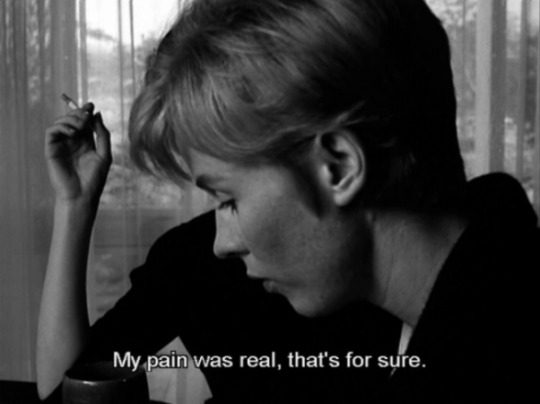
Alma continues to open up even more. A silent companion only leaves room for one talker. Who is the patient now? The camera angle features Alma’s speaking face in the foreground blocking Elisabet’s; one head blending together. It’s as if Alma is discovering things about herself for the first time...about her chosen profession as a nurse and a past relationship. The conversation moves to the bedroom. Both are in their night gowns. Alma tells a long, detailed story about an orgy on a beach involving her friend and two boys that approached them while they sunbathed nude. Elisabet is sitting up in the bed and Alma sits in a chair. Elisabet shows a few signs of pulling away due to Alma’s gregariousness and wears a cool “been there done that” expression, but as the story continues she becomes focused, still, and calculating. If I had to guess, this sexual experience of Alma’s is the most intense event of her life. She had cheated on the man she is now engaged to and is so vulnerable here in her confession. The acting by Bibi Andersson is superb. Alma ended up pregnant and had an abortion. She weeps with guilt. Is Alma’s mask fully off, revealing too much, bare to the bone? What does Elisabet really think about all this? Is she “gaining” from this somehow?
They move to the dining table again in the other room. It’s raining outside. Alma is loose and drunk, in a manner one is after a huge confession. She again announces her inferiority, saying how boring she must be to Elisabet and what use she could possibly be to her. She also says that she should be more like Elisabet and not talk. Alma then points out how they look alike and she could turn into her if she made the effort. Then she says, “You could turn yourself into me just like that. Although your soul would be much too big. It would stick out everywhere!” My favorite lines of the film. Alma then puts her head down on the table as if to sleep. Elisabet then speaks for the only time in the film, telling Alma to go to bed before she falls asleep at the table. Alma looks up blankly, puts her head back down, then pops up again and repeats what Elisabet just said. Was it just a thought or did Elisabet actually speak? Does Alma flirt here with Elisabet when saying good night? It looks like it.
Alma’s Awakening
The bedroom is foggy. Alma gets a glass of water then lies down in bed. Elisabet walks up the hallway into the bedroom, looking at Alma then into the white room around the corner. She then turns back. A horn from a boat blows ominously outside in the night sea. A slight breeze moves a white transparent curtain in the doorway. Alma raises as if summoned, goes to Elisabet and leans her head on her wearily. Then the iconic shot of the the two looking into the camera at us. Elisabet places her hand on Alma’s forehead moves it back over her hair as if this is allowing Alma to “see” now, an awakening...Elisabet being the guide. Is this an opening of the third eye? It may be a stretch, but it crossed my mind. The two actresses are so beautiful here, softly lit from above, and fold into each other afterwards like an integrated yin and yang as picture fades to black. The music reminds me of Hitchcock’s and I’m not sure I like it, but the moment is indeed powerful. Did Alma dream this? Does it matter?

Chaos
Picture fades back in and Elisabet greets us on the rocky beach. She enters frame from below, taking a picture of us with a stills camera. Alma is in the distant background next to the shore. Elisabet walks to her and takes a photo of Alma as she clumsily poses. Alma coldly asks Elisabet if she was in her room last night. Elisabet shakes her head no and shows no sign of lying.
Later in the house, Alma takes the mail to sent be sent off and has to take a drive to do this. In the car, she opens up Elisabet’s letter to the Doctor in curiosity. The first part of the letter is complimentary to the living situation and Alma, but then Elisabet writes, “it’s fun studying her (Alma) and how she cries over past sins.” The letter also mentions Alma’s orgy and the abortion and says how she “complains that her notions of life fail to accord with her actions”. Alma is stunned and gets out of the car. She stands stolidly dressed all in black next to a murky pond looking at her reflection in wide shot.
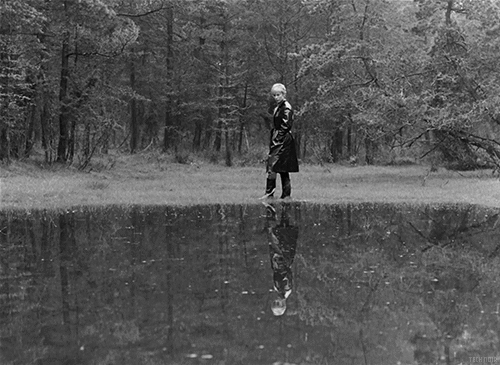
Alma is back at the house now in a black swimsuit with a grave look on her face. This expression was nowhere to be found until this point in the film. Outside she breaks a glass on accident and begins sweeping it up. She notices she missed a large piece, but leaves it after seeing Elisabet coming outside. The camera moves from the piece of glass as Elisabet’s bare feet pass by it, then back up to a watchful Alma. Again, camera fixed on the piece of glass as Elisabet narrowly misses it and tilts back up to a silent Alma. Eventually, Elisabet steps on it, making a painful sound in response. Alma watches from inside the house with a hard scowl behind a transparent curtain. Elisabet stares back with a concerned, furrowed brow as if she knows what Alma did. A violent sound effect comes in along with a literal splitting of the picture, a deep transition within the film and the character of Alma. She has crossed a line.
My first impression of the sound effect is it’s a film spool that is hung up in the machine...like the film has broken (similar to the glass) after Alma committed this act (or non-act). The shot then literally burns up, starting on Alma’s face to a quiet white screen. This effect would have seemed cheesy in almost in other film, but I think it works here. It is simple and clear and connects to the meta, self-reflexive nature of the film.
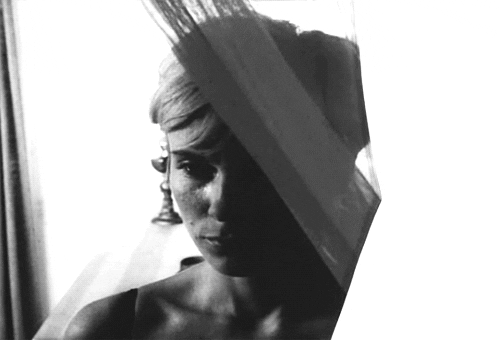
Everything has changed now. Alma's insecurities have caused her to become darkened. Her sought-after approval from Elisabet has been betrayed by the letter to the Doctor. She has lost herself and taken on a new protective persona. Or has she found power (even though misdirected) after her awakening? Pain leading to growth in her cycle? What is for sure now is she is very far from the sweet, unsure nurse we saw at the beginning of the film.
A voice in reverse is heard now (an effect David Lynch must have gleamed for Twin Peaks). We are again shown images similar to the opening of the film... the vampire, the skeleton, a spike going into Jesus’ hand accompanied by a disturbing scream and an extreme closeup on a shifty eyeball that the camera pushes in on... What do the eyes say and can the camera uncover it? Can we see the soul if the camera looks into the eye close enough? Camera fades in to Elisabet walking around the house, picture blurred and in slow motion, which eventually becomes focused and at normal speed. She exits the house and goes outside looking for Alma. Eventually she finds her and touches Alma’s cheek with sweet, subtle affection and sits down to read. Alma is dressed in all black with dark black sunglasses. She acts cool and distant and lurks around behind a sitting Elisabet, poking at her with words and becoming visibly more upset and restless by the moment. She soon loses the facade saying she feels used and discarded (like the Doctor explained Elisabet’s “acting role”). Alma continues saying she has been hurt very badly and laughed at behind her back. She then confesses she read the letter to the Doctor and accuses Elisabet of getting her to talk and mention things she’s never mentioned to anyone! Alma pleads for Elisabet to speak. The argument becomes violent. Elisabet slaps Alma and bloodies her nose. The two stop. Elisabet begins to laugh at the ridiculousness of the situation. I thought Alma might join in with the laughter here but she does the opposite and runs into the bathroom crying. She is so sensitive about being laughed at at this point that the internal turmoil just increases. After a while, Alma reenters the room calm and raw. She asks Elisabet if being truly genuine, telling the truth, not evading things, truly being oneself...sloppy and silly...can this be possible? She says Elisabet might get better if she just allows herself to be what she is. Elisabet smokes her cigarette, cooly facing the opposite direction and doesn’t react or show much at all. Alma is unsatisfied with the lack of reciprocity and says angrily she knows how rotten Elisabet really is. This strikes a nerve with Elisabet and she storms out. Alma immediately feels regret and asks God what she is doing, then runs after her.
A long, beautiful tracking shot along the rocky beach as Alma chases after Elisabet apologizing profusely. She says how honored she was for an actress of her caliber to be interested in what she had to say, but then how hurt she felt because she was betrayed in the letter. Alma “blabbers on”. Elisabet eventually turns as if she might embrace Alma, but coldly walks away. To me, it was as if the mask was projecting one thing, creating a pause in Alma, thinking that an embrace might occur, then Elisabet’s action doing another thing, walking away coldly. An example of the mask not connecting with the action. Alma falls to the rocky beach, distraught.

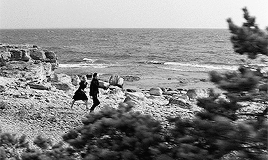
The next shot, in stark contrast, Alma is sitting serenely near the shore. Elisabet is in the house, pacing with a cigarette, looking out the window (that reminds me so much of a shot in Woody Allen’s “Interiors”). There is a deep anticipating heaviness that Bergman is masterfully able to create here with the help of the music. Elisabet shows more emotion here than usual. Is it because she is alone and no one is there to observe her? She shows visible sadness again soon after, alone in her bedroom. She then comes across a photo in a book. It is of Jewish children being lined up by the Nazis in World War II. Her sadness becomes deeper and focused, maximized by the horror-enducing music accompanying. Elisabet’s empathetic contemplation here is similar to when she was at the hospital watching the burning monk in the Vietnam War news footage. Closeup on the picture, which is of a young boy with his hands up as a gun is pointed at him. The camera then cuts to various other closeups, bouncing around the photo examining every face...every mask.
What is Bergman trying to tell us here? This may be a stretch, but my first thoughts were that Bergman is briefly pointing at something universal which includes all human psychological underpinnings. It is connected to our two protagonists in the film and what 's happening with them psychologically, but for moment looking beyond them, silently illuminating the potential evil (the shadow) within all human beings. That the fear of truly living without a mask can create such a sickness in man that one is potentially able to create this type of destruction towards others. That instead of facing oneself honestly, being whatever it is that you are, that a mental illness can form and the persona can fully take over. That one can become so identified with the persona of being a “Nazi” that they would point a gun at a “Jewish” child.
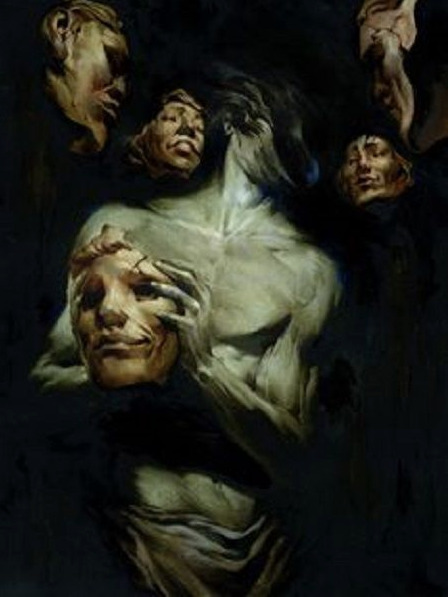

Again, back to the psychologist Carl Jung who looked to Eastern philosophy often as a reference for his work. In Eastern philosophy there is a common belief that under the mask is the godhead within each individual. To repeat from earlier, Jung believed the mask (or persona) was not the true self and could keep us from a much deeper, truer self which included a unified “collective unconscious” that all humans share. Opposed to a healthy mask essential for social life, if it completely overtakes the godhead (or the true self) chaos ensues within that individual because one is also identifying everyone else solely based on their masks. Divinity can no longer be seen in ones’ fellow man or woman. All humanity towards others can potentially be thrown out the window because of this difference in “mask” and atrocities can occur because of the dual nature of this thinking, rather than a unifying recognition of a collective unconscious in the “other”. And if there are enough individuals, disconnected from the godhead/true self, you get Nazis killing Jews. ALL mask. ALL persona. And no recognition of the holy selfhood in others, which ultimately stems from fear, blinding the individual... And taking us back to the film of our two fearful protagonists where the persona is being focused upon.
Does Elisabet understand all of this yet is unable to change herself? Or is her silence a rejection of the mask, a rebellion to conform and/or an attempt to get better? I don’t know.
We cut to Alma now in her bedroom and she is having a bad dream, shaking her head violently side to side. She wakes up and turns on a portable radio. Through the static it says “we don’t talk...listen...or understand”, then the voice says something about “Elisabet” and “by what means should...to enable.” Is the radio representative of her conscious mind tuning in to another frequency? I see no other reason for the radio that randomly appears out of the blue. We then see Alma going into Elisabet’s room, who is asleep. Alma begins watching her, smelling her, taking her in and even touches her face. She comments aloud how Elisabet’s face is slack and her mouth is swollen and ugly, then points out a wrinkle. She also mentions she can see a scar that Elisabet normally covers with makeup. Alma seems to relish in the fact she sees her this way, with her guard down and is able to feel superior in this moment. Alma hears a voice from another room that says “Elisabet” and leaves. Is it the radio from a few moments before? Elisabet then opens her eyes and looks into the camera again at us. She was not asleep. She was acting like she was sleeping. Even when Alma thought she was superior, Elisabet was still conscious. Perhaps because the unconscious never sleeps and Elisabet is representative of the unconscious.
"Elisabet” and Mr. Vogler
This next part becomes the most surreal and hardest to understand in my opinion. It is dawn now. Alma walks through the house, then is startled by Mr. Vogler, Elisabet’s husband. He calls Alma “Elisabet” and begins explaining how this has been hard on their little boy and continues further about their relationship. Alma once again says she is not his wife, as Elisabet creeps up from behind fixated on Mr. Vogler, lurking behind Alma’s shoulder in a two-shot closeup. Elisabet then guides Alma’s hand up to caress Mr.Vogler’s face, like Alma is her puppet. He is a strange, stern looking man with dark sunglasses. Alma now is under the spell that this is her husband, and says she loves him very much. We’re now watching in a reverse shot with Elisabet in the foreground, looking upset, as the other two are professing their love for one another. Alma moves her gaze to Elisabet in a conniving way and continues with Mr. Vogler in spite of Elisabet and they kiss. This is one of the most puzzling parts of the film to me and I found myself, mentally, wanting to check out. I had to consciously will myself to pay close attention and try to decode this. I think because it smashed the narrative I currently had going in my head of what I thought the film was. It’s as if Alma is now a vessel controlled by Elisabet, but why? Alma seems to be unaware of Elisabet, then aware. Is it because Alma, who adores Elisabet, can now see what it's like to be in her shoes? Is Elisabet upset because Alma is now privy to this? I think there is also a deeper subtext throughout the film where Alma is representative of the “conscious” and Elisabet the “unconscious”, which is running parallel to what is literally being shown, yet sometimes they blend like a dream. I’ve mentioned this once and is worth mentioning again. Alma/Elisabet and Mr. Vogler are laying down now and it seems they have just made love. Alma/Elisabet soon goes from tender to a violent struggle asking to be anesthetized! She cries saying she is cold and rotten and indifferent, “all lies and imitation”. The camera moves to an extreme closeup on Elisabet and fades to white. Does Alma clearly see Elisabet now? Was Alma able to break through Elisabet’s persona and truly feel what it was like for her with her husband and why they are estranged? Or it could very well be Elisabet detaching herself from the past experience and processing it this way as we see things from her point of view. And rather than Bergman showing a flashback with Elisabet and Mr. Vogler, he presents it this way with Alma standing in? I keep asking these questions because I feel the questions are more important than the answers. A film that just gives answers is not a film I am interested in seeing. If answers are the most important thing then one should just read the dictionary and not watch Persona.
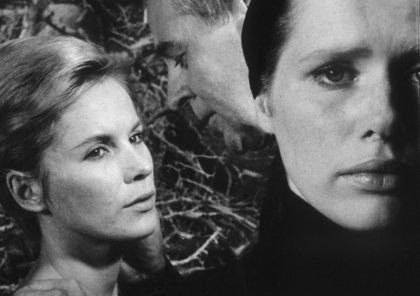
Alma Strengthened?
It is daylight now. Mr. Vogler is nowhere to be found. The scene starts as almost a complete nosequitar to what just occured. Alma sees Elisabet hiding something under her hand and makes her show what it is, like a student being disciplined by a teacher. It is a picture of Elisabet’s child. Alma asks her to talk about it. Elisabet shakes her head no, so Alma speaks for her. Alma’s attitude is similar to the Doctor’s now and is dressed exactly like Elisabet. Both have been in black most of the time, but now it is exactly matching, up to the detail of the black headband. So why is it important they dress in black? There must a reason, or several. I’ve seen some far out interpretations of what this film is, so I’m going to take a swing regarding a possible reason why this deep black is worn by the characters a majority of the time. Both are in a state of “dying”. Not in the physical sense, but psychologically...a chaos, a putrefaction (alchemy term). It doesn’t necessarily mean something so simple as “black is negative”/“white is positive”, but chaos/putrefaction/psychological death is an essential stage in life as fragmented reality occurs. It is impossible to stay in the light all the time. We are human. We are foulable beings tossed out of the Garden of Eden. We become confused, tragedy occurs, we become fearful. This is what life is and it’s inevitable. In this film’s case, unity does not reign but a duality of “Alma” and “Elisabet”, who must pass through this stage in the cycle in order to become unified and “in the light” again (atleast that’s the goal). The film is at a point in their lives in which chaos reigns, for reasons I’ve previously highlighted regarding the shadow, persona and self. And Carl Jung was very well-versed in Alchemy and it’s metaphors, as I assume Bergman was as well. Also, perhaps this connects to the morgue and skeleton during the beginning sequence
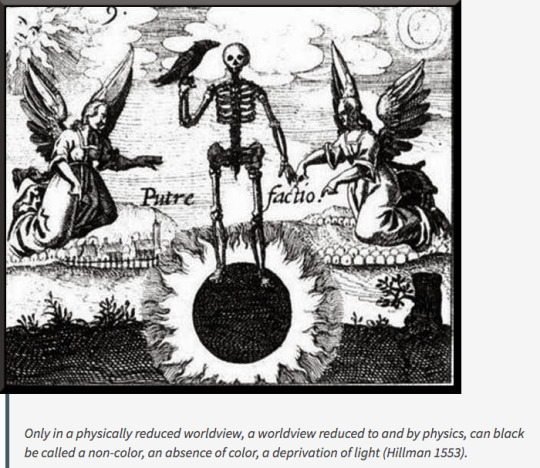
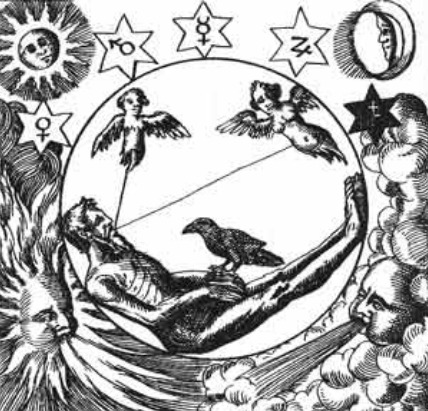
This is the most still and confident we have seen Alma in the film. Alma now begins to speak Elisabet’s story to Elisabet. This begins with a comment someone made to Elisabet at a party telling her that she had everything as a woman and an artist but lacked motherliness. Elisabet, in turn, then became pregnant. Elisabet next felt frightened, in over her head regarding all that pregnancy and motherhood required of her, but she “played the role”, put on the persona as a Mother. As Alma speaks, this is the most emotion Elisabet has shown in front of Alma the entire film, looking away, furrowing her brow, half-lit, terrified and found out! Alma continues, saying Elisabet had wished the baby would’ve been stillborn and a deep shame washes over Elisabet as she ducks her head. Alma is vicious, continuing on about how much Elisabet despised the baby, how it cried day and night and how she was scared with a bad conscience. The boy eventually went to live with relatives and Elisabet went back to the theatre. The boy loves his mother greatly, but Elisabet is always cold and indifferent...disgusted by him. The scene then starts over again, but with an over-the-shoulder shot onto Alma this time. The exact same dialogue is repeated and we have to again hear this painful dressing down of Elisabet and her resentful relationship with her son. The over-the-shoulder shot turns into two 1-shots, the same as with Elisabet the first time. Alma is also half-lit and I don’t think she ever blinks (which made me think of Paul Thomas Anderson’s film The Master scene at the table but between two men.)
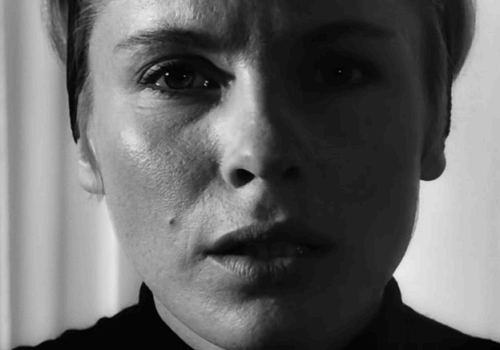

After Alma finishes (on a straight-ahead closeup) Elisabet’s face begin to take up the darkly lit half of Alma’s and she says, “No! I’m not like you”, “I’m Sister Alma, I’m just here to help you.” The two faces are now one. Duality to Unity. Both face-halfs are now in the light. Elisabet’s half appears and disappears a few times and then appears fully with punctuating music at the end of the scene, freeze-framing before fading to gray. It is striking how well their faces actually match up.
Obviously I’m going to expand on what I think happened here. Alma has entered Elisabet’s head so deeply, she was able to intuit this dark story about Elisabet and all of the unflattering details. Alma had to suffer to get to this point in order to enter Elisabet’s mind. And her entry is so intense she begins to lose herself. Her self-assuredness then quickly turns back to the vulnerable, scared Alma from before. Is this for the best Elisabet hears this? I kept thinking while watching that a regular moviegoer would interpret this as overly harsh by Alma. But it is also Elisabet becoming fully aware of why she decided to become pregnant in the first place and the subsequent emotional damage caused to her son. It then covers up to the point where she becomes mute during the Electra play. Elisabet needed Alma in order to get to this point of realization, as painful as it might’ve been.
A Standoff and Enigmatic Ending
We open on a 1-shot of Elisabet and a quick close-up catching a glimmer of defiance as Alma enters the room with her nurse’s outfit on now. Alma attempts to match her defiance and a stareoff ensues. Alma says she’s learned quite a bit and physically punches forward directly in front of an unflinching Elisabet. Alma then leans in and says she will never be like Elisabet (denying the shadow) and says she changes all the time and Elisabet will never get to her.
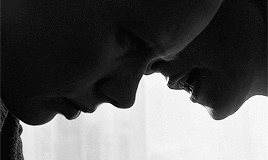
Another stareoff. Soon Alma breaks and begins nervously hitting the table.
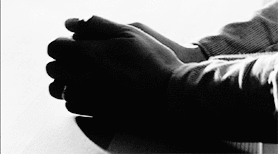
I have thought about this scene moreso than any other scene after watching the film. To me, there is so much to unpack. Alma is never able to get a leg up on Elisabet for very long. Again, I think this reinforces the metaphor that the conscious is unable to escape the unconscious. The same as a human being unable to escape the eye of God. This is why pre-determination was mentioned at the beginning of this post. If we are following this logic, Alma is predetermined not to gain a mental edge on Elisabet. She’s not formed to have the depth that someone like Elisabet has, no matter how much she’s “learned” or the mask she has tried to maintain. Elisabet knows her thoughts and has the mental ability to consume her and Alma knows this and it manifests in this anxious pounding on the table. Alma somewhat regains composure in her face but her words are gibberish nonsequitars...almost poetic but too garbled. Elisabet turns around and is in the foreground of a closeup 2-shot and mouths her words as if she is controlling what’s coming out of Alma’s mouth. Her mouth does not sync with the words but it does convey that Elisabet is in control. Alma continues to struggle, trying with all her might to articulate what she wants to say. But the gibberish continues, as if two minds are battling one another and Elisabet is winning, silent and calm, while Alma strains to squeeze out meaning verbally with little luck. Then, something revealing occurs... Elisabet runs her nails down the inside of Alma’s forearm until drawing blood, then goes down and begins sucking the blood like a vampire. Eventually Alma fights her off and begins slapping her repeatedly until it cuts to black. I did accidentally stumble across an article by BFI (British Film Institute) that states Bergman intentionally took Elisabet’s surname (Vogler) from a film called “The Magician” involving a character who was an artist that sapped the energies of others for his artistic gain. This makes sense because, as mentioned, Elisabet has used her mental energy to consume Alma by essentially playing the role as the mute patient. I don’t think this was an elaborate plan on Elisabet’s part, but kind of fell in her lap and she went with it. Also, due to the meta-nature of the film (inside the film projector, characters looking into the lens, etc) is Bergman also implicating himself? This film is very aware of itself and makes this clear several times. If I had to guess, Bergman is also saying he is not innocent, that he is using these characters/actors to play out his dream in order to gain a better of understanding of his own psyche. Also, are we, the audience, implicated as well? Elisabet looks at us, takes our picture, is aware of us...aren’t we placing ourselves inside these characters? We see their vulnerabilities, analyze their weaknesses, pass judgement...we use them in order to come to some type of new understanding within ourselves or for our own entertainment. Is the nature of art itself vampiric? In a sense, are Elisabet, Bergman, us and all artists vampiric in a way? Absolutely.

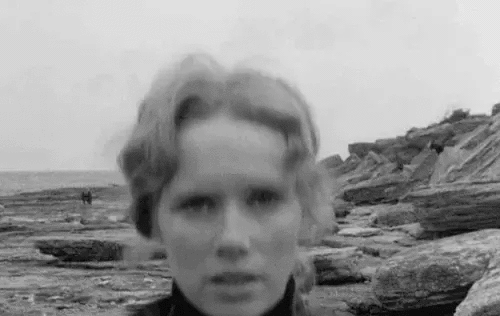
Then, right when you think you have all it figured out, there is another couple of scenes that make you think otherwise. You have to take one scene at a time with Persona. It is less of a narrative and more of a dreamlike poem. Alma nows enters the hospital room and Elisabet is in bed in a sedated state. Alma lifts her up slightly and says, “Nothing, That’s how it should be”, in a comforting manner and then lays Elisabet’s head back down. It then fades into a repeat of the Alma/Elisabet dream shot of them looking into the camera from earlier in the film, perhaps comforting us the audience, slowly waking us up after this traumatic, confusing ride we’ve been on as the film winds down... telling us it’s nothing, it’s okay, it’s how it should be. In turn, Alma wakes up in her bedroom in the Summer house. We are not in the hospital anymore. She peaks out and sees Elisabet packing her suitcase. Alma then begins putting all the summer outdoor chairs inside the house to pack up before she leaves. We do not see Elisabet again. What happened to her? Did she just leave without saying goodbye? Alma looks into the mirror and brushes her hair back as was done in the scene with Elisabet from earlier. A translucent image of Elisabet then appears behind her as seen below. She then smiles to herself and puts on her hat.
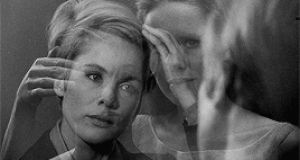
As she exits outside with her suitcase, there is a large concrete sculpture of a face that the camera moves to. It then flashes to a shot of Elisabet on stage as Electra. Alma walks to the bus. It then cuts to a camera sweeping down from above on a film set to capture Elisabet in frame. It cuts back to Alma getting on the bus to leave and the camera pans to dark rocks on the side of the road, then fades into the boy in front of the screen from the beginning of the film, reaching out to touch the screen. The screen includes a blurry image of what looks to be Alma that soon fades completely to white...a screen within a screen. As we, the viewers, reach out with our minds to comprehend exactly what the ending means, the shirtless boy with the glasses also reaches out to feel an image that disappears. The film roll runs out (literally on screen), falling off the spool and the projector burns out. The End.
To conclude, I just realized that attempting to analyze this film is almost like chasing a conspiracy theory, looking for connections that may or may not exist. I know that I missed some things. I know that I got some things wrong, but the joy of thinking about these films is that's okay. :)
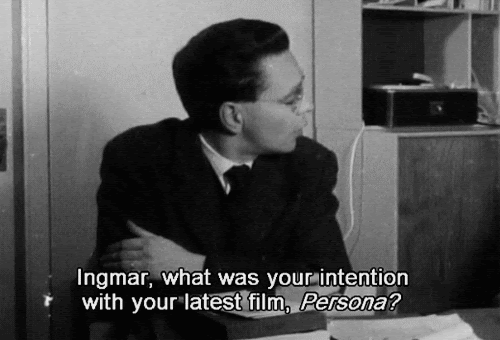
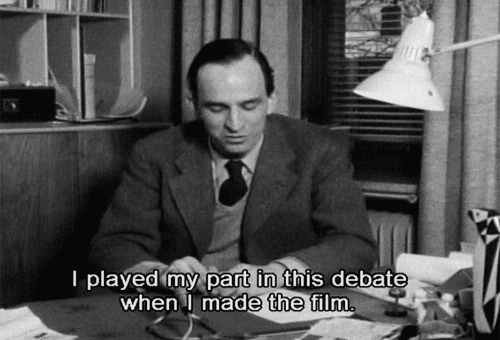

Also, in closing, I wanted to add an image that I had an immediate reaction to while looking for behind-the-scenes photos. As you can see, it is of Bergman, Liv Ullman and Bibbi Andersson. And as you know by now, this a very heavy, dark film on identity and internal chaos. But there is such love and sensitivity and thoughtfulness in this photo of three artists in the middle of making something extraordinary and revolutionary in cinema. It brings up some deep emotions in me because this is something I yearn for, almost like the boy touching the screen. I do truly feel I've had small glimpses of this type of satisfaction while working on my own projects, sparking a recognition, knowing it is rare and beautiful and transcendent, providing more to aspire to.
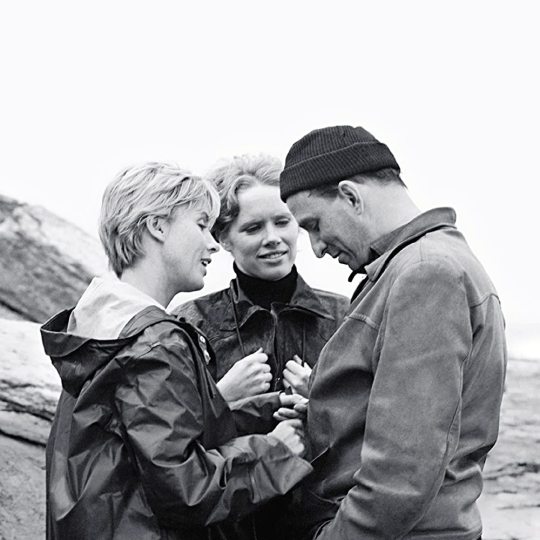
#cinema#persona#bergman#livullmann#bibiandersson#ingmarbergman#swedishfilm#filmanalysis#1966#criterion collection
7 notes
·
View notes
Text
THE SILENCE OF THE LAMBS
When my concerned parents faced the early and unpleasant realization that they were raising a ravenous little horror hound, it meant that they had to somehow split the difference between their strict curbing of my potentially mid-warping viewing habits, and their principled encouragement of unfettered reading. That must be how I came into possession of a copy of Thomas Harris' harrowing police procedural The Silence of the Lambs at the tender age of 10, even as the film adaptation was being touted by many viewers as The Scariest Movie of All Time. I carried that book around like the Bible well into my teenage years, reading and re-reading it with even greater fervor after my parents finally decided that the film was sophisticated enough for me to watch without it turning me into some kind of animal-torturing arsonist. (Said screening was chaperoned and accompanied by an academic post-viewing family discussion, of course) The decision seemed to make sense; after all, THE SILENCE OF THE LAMBS had swept the Oscars the year it was released, scooping up wins for Best Director, Best Actor, Best Actress, Best Adapted Screenplay, and Best Picture. This is not to say that my intellectual and art-appreciating family regarded the Academy as the ultimate arbiters of taste and achievement. I mention these accolades more to point out that, as my parents had surely noticed, the film holds a certain power over viewers on both sides of the high-low cultural divide, a spell that has hardly weakened in its twenty-seven years of life.
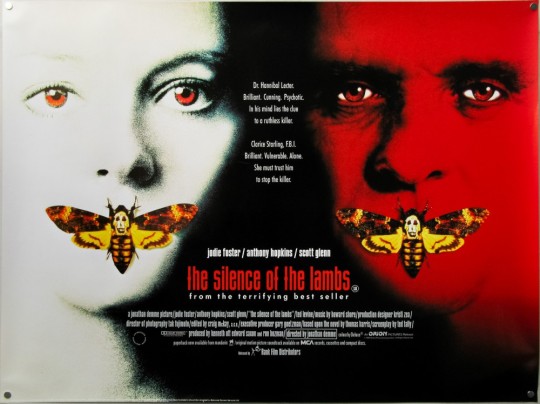
As a child, I certainly responded to the same things that piqued the general public: Anthony Hopkins' iconic performance as Hannibal "The Cannibal" Lecter, his ambiguous romance with purehearted FBI trainee Clarice Starling, and the controversial perversity of serial killer Buffalo Bill. Though the story shares the influence of real-life ghoul Ed Gein with classic shockers like PSYCHO and THE TEXAS CHAIN SAW MASSACRE, the impact of SILENCE is more akin to that of DRACULA. Much of the enduring discussion about the film revolves around the tantalizing chemistry between the preternaturally elegant Dr. Lecter and the virginal Starling; the rest is somewhat unfortunately focused on Ted Levine's eccentric performance as the (pseudo-) transsexual murderer at large, which has come under some understandable scrutiny. However, it would be unjust to reduce Jonathan Demme's movie to a gothic romance, or a gory shocker, or a campy cult item with ironic eroticism and a great soundtrack. There simply have to be better reasons for a movie to stick around this long, lingering in the minds of stuffy critics and the hoi polloi alike.
In preparing my statements about what makes THE SILENCE OF THE LAMBS stand out, I learned something very shocking: It began its life as the directorial project of Gene Hackman. Hackman eventually dropped out when the script produced by (Oscar-winner) Ted Tally turned out to be too violent. Prospective Starlings like Michelle Pfeiffer and Meg Ryan were similarly disgusted, so Demme got stuck with a less likely candidate in (Oscar-winner) Jodie Foster. Personally, I find (Oscar-winner) Demme himself to be an unlikely candidate. The director cut his teeth on exploitation movies under Roger Corman, and by the time of SILENCE, had distinguished himself as a hipster extraordinaire, directing classic performance videos for the Talking Heads and Spaulding Gray, as well as chic comedies speckled with cameos from the likes of John Waters, and underground music firebrands from New York's new wave scene. Time would prove that Demme and his frequent collaborator, cinematographer Tak Fujimoto, were perfect choices for this grim project, which only supports the idea that there is something more happening with SILENCE OF THE LAMBS than its gruesome violence and epic sexual tension.
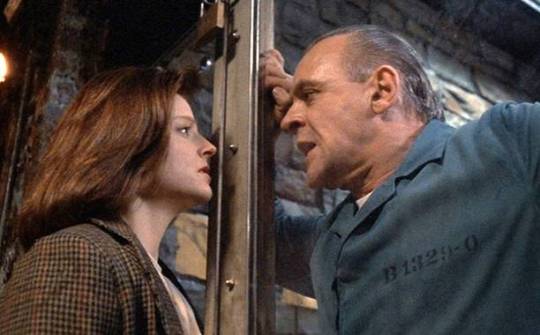
In light of these more famous elements, one might expect an adaptation of Thomas Harris' grim and seductive novel to be grandiose, expressionistic, swathed in a dense physical and emotional mist, rumbling with its own pomp and circumstance. An orphan from the hills of West Virginia, Clarice Starling is a tragic hero from the start, guarding her broken heart against a world of condescending and hostile men. Her mentor Jack Crawford seems to distinguish himself from the herd by assigning her the ambitious task of interviewing notorious serial killer Hannibal Lecter for the FBI's files--but in fact, Crawford is counting on Starling's feminine charms and naivety, secretly using her to manipulate Lecter into profiling a killer at large, Buffalo Bill. In spite of this nasty revelation, Starling sticks with it, suffering Lecter's high-minded insults and penetrative analysis of her character, and eventually earning his admiration. She proves herself not only brave and determined, but a detective of unparalleled wit and instinct, single-handedly taking down the polymorphously perverse Buffalo Bill in his moth-filled subterranean lair, rescuing a high-profile victim where the entire rest of the Federal Bureau of Investigation have failed.
This all seems to portend a bigger, louder movie than what has been committed to film. However, the book has a certain organic grit to it, something honest, downbeat and tragically real, which Demme and Fujimoto grasp instinctively. The film provides a dry, frank view of the life of Clarice Starling: the toil of academia, the drudgery of physical conditioning, the undermining attitudes of her mostly-male peers. Shot in West Virginia and Pennsylvania, Starling's world is bleak and desolate, but earnestly so, without the pageantry of the film noir and Universal horror movies with which it is so easily compared. Demme's education under B-movie king Corman shows here, and makes for a much more compelling iteration of the story than we might have from someone less accustomed to economy. While SILENCE has developed a reputation for its brutality, the film is not remotely so gore-drenched as many traumatized viewers would have you believe. That said, it may be the film's generally stark and desicated look, its workaday-ness, and its endless (wonderful) dialogic exchanges that throw into relief its comparatively minimal violence, which usually appears not in scenes of assault, but in crime scene photos or autopsy scenes.
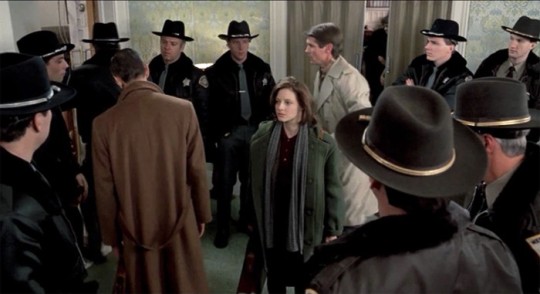
The blanched, dreary look of the film also offsets the emotional plight of Clarice Starling. She is afforded no real romance, external or internal. The petite and clear-eyed orphan is visibly used to, and exhausted by, the constant need to look out for herself, and SILENCE will see her shuffled from one humiliating personal trial to the next. She is led into a perilous situation by a mentor who pretends to respect her abilities, but who really counts on her to fall short of discovering his scam; She is trapped in roomfuls of macho cops who scarcely acknowledge her; She has to negotiate the sexual attention of evidence technicians and bureaucrats; She even has semen flung at her by a particularly rambunctious neighbor of Lecter's. (And how often do you see that in any movie? As gross as it is, it has a way of reinforcing the extreme adult-ness of Demme's often dry, methodical movie) And then of course, there is Lecter himself, who turns Starling's personal vulnerability into a form of currency with which she can buy the scant clues that lead her to her quarry. Instead of eroticizing the anomalous femininity that Starling brings to the traditionally masculine world of law enforcement, Demme constantly reminds you of her fear, her embarrassment, her alienation. One can also imagine the temptation to Ripley-fy the character, presenting her as a fully-formed badass not to be fucked with. Instead, by eschewing both these femme and fatale modes, Demme describes Clarice Starling as three-dimensional human being whose heroism is extremely hard-won. While the character is undeniably one of the great Strong Female Protagonists, Jodie Foster's performance somehow defies the cinematic semiotics of gender altogether, giving us a person whose most important qualities are purely psychological. Tak Fujimoto drives the point home by frequently filling the screen with closeups of her face, focusing us on what she thinks and says, taking the proverbial heat off her body. Even as Lecter probes her for painful biographical information, Starling's sexuality remains entirely private--still a rare thing in any movie with a lady lead.
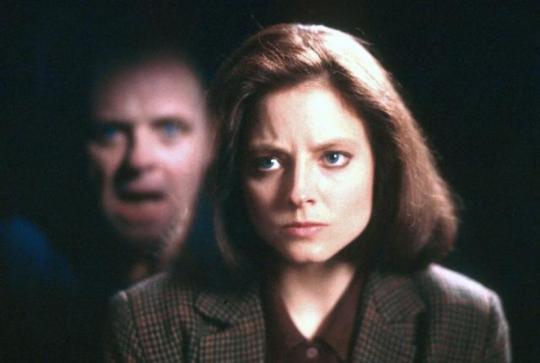
I don't mean to suggest that THE SILENCE OF THE LAMBS is principally successful because of its plucky girl detective--that contributes to its greatness, but not in the feminist fashion that I seem to be angling for. I am reviewing this movie presently because I recently found myself looking back on my own history with it, comparing my feelings with those of popular audiences, and thinking, "What is The Silence of the Lambs really about?" It can't be so beloved *only* due to the sexy slow burn between Anthony Hopkins' Count Dracula and Jodie Foster's Mina Harker. It can't be *just* a matter of the exotic insanity of the gender-bending madman sewing together the flesh of his victims and dancing provocatively to "Goodbye Horses" by Q Lazzarus (a sadly mysterious musician who Demme certainly knew from his involvement in the New York underground). All of these characters, and their respective dynamics, contribute to the important thrill of this movie, but not in the way that most people seem to think.
Rather like the director's earlier work with iconoclastic punk icons and indie auteurs, THE SILENCE OF THE LAMBS is about authenticity. Hannibal Lecter, the unparalleled genius whose culinary expertise is part of his murderous MO, is a serial killer because he has such refined taste and decorum that he cannot live peaceably among other people. He favors victims whom he perceives as tacky, pretentious and impertinent--Starling knows that he would never harm her because, as she famously remarks, "He would consider it rude." Lecter is fascinated, not by her youthful beauty as Crawford had hoped, but by her sincerity. Starling is brilliantly intelligent in her own right, as she proves through her police work, but she doesn't have an ironic bone in her body. She is the most unpretentious individual alive, and nothing could be more interesting to Lecter, who preys upon people who are untrue to others and to themselves. Meanwhile, we have Buffalo Bill, who is attempting to change his sex by crafting a full-body "woman suit"--but, as Lecter insists, the killer is not a "true transsexual" whose legitimate identity is that of the opposite sex. Buffalo Bill is someone who was reared by his abusive parents to hate himself so much, that he is compelled to escape his natural identity; becoming a woman is less important as a matter of self-actualization, than as a means of becoming an entirely different person, *any* different person. He has been so radically alienated from his own essence by this self-loathing, that he is incapable of authenticity of any kind.
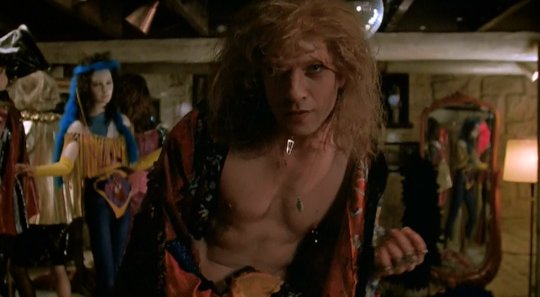
That, I really think, is the secret power of THE SILENCE OF THE LAMBS: the at-once satanic and profoundly innocent declaration, "to thine own self be true". I would really love to get into a deeper dive on this movie at some point, to discuss what I think must have been the very best and very last time that Anthony Hopkins gave us a fearless and unpredictable (and in this case, somewhat hilarious) performance; to insist that Ted Levine as Buffalo Bill and Brooke Smith as his would-be victim actually give the best performances in the whole movie; to talk about the problem of the Ubiquitous Daddy Figure (of whom there are no fewer than THREE in this movie) in so many narratives about powerful women; to simply analyze the movie's sly psychological techniques, like fully humanizing Brooke Smith *just* by showing her singing a few bars of a beloved pop song in closeup, immediately before her fate takes a disastrous turn. (I would probably not take such an opportunity to investigate accusations of homophobia and transphobia, which requires a smarter and more directly experienced voice than my own) There is really a lot to say about why SILENCE is so powerful, without even threatening to address its most famous features. Unfortunately, I don't have the gumption or the madness to commit all that to Letterboxd at the moment, so I'll have to be satisfied with my primary conclusion: That the film's simplicity and gritty naturalism mirror its commitment to spiritual purity, honesty, and self-knowledge at all costs. Even at the high cost of wearing a muzzle, any time they let you out of your cage.
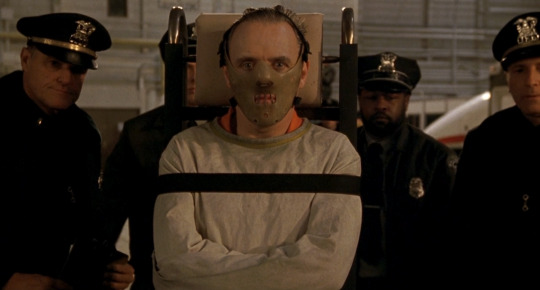
#blogtober#the silence of the lambs#thomas harris#jonathan demme#tak fujimoto#jodie foster#ted levine#brooke smith#scott glenn#clarice starling#hannibal lecter#buffalo bill#horror#adaptation#ted tally#suspense#procedural#thriller
28 notes
·
View notes
Text
Will Provoke Your Thoughts ... Could Change Your Life
A review of The Last Year by Amelia Banis - BalboaPress - 216 pages - ISBN 978-1504397575 - Amazon page
Let's start at the beginning: it took a long time to write this review - to be able to write this review - because this book was so singular, in such unobvious ways, that the musing after finishing took far longer than the reading. This is a first indication that a book has much within it: that it isn't swallowed like a cultural chicken nugget and forgotten, but that it demands engagement - unless one only wants a chicken nugget, consumed and then no more. One supposes some could take this book that way, but this reader is not one of them. So it's the path of the unique meal of unexpected delicacies and resonances that keeps nourishing long after one (thinks one) has risen from the table.
On the face of it, the story is simple and clear. Amelia Banis was an adopted child who had a fraught relationship with her adoptive father, Diederich - German-born, fatefully so in 1938, who survived World War II and his father's time in a Soviet prison camp to become almost a caricature of the closed, reactive Teutonic patriarch. His Swiss-born wife, Lilia, is Diederich's polar opposite in her kind, quiet ethereality. Between these two extremes Amelia grows up, and one senses that from the beginning Amelia and Diederich are naturally entangled, the more so for the Diederich refusing to admit the existence of any emotions save irritation, exasperation, and anger - determinedly directed at all but himself.
The Last Year is a memoir compounded of a beginning in the big picture and zeroing down inexorably into an event-by-event recounting of the eponymous final year of Diederich's life.
This is no spoiler, for Ms. Banis tells us at the very start, with a striking first chapter opener with her making hospice arrangements for this monumentally stubborn opposite number and ending with his taking his final breath with Amelia and her husband by his side. There is no escape for Diederich, no roseate deathbed realization. The following twenty-six chapters show how the Diederich-Amelia dyad stretched and spun and writhed - never severing - its way to that final end. Reading this beginning, the author's necessary and ingenious avoiding of the boredom of a linear decline to death (just desserts) or an unlikely pink rainbow scene (the old devil had a heart after all), one feels right away in good hands. She is taking care of us, too, and will make sure it's an interesting ride. One thinks of Akira Kurosawa's epic 1952 heart-movie, Ikiru, which begins with a shocking closeup of the protagonist's abdominal X-ray, which the businesslike narrator informs us shows terminal cancer. Mr. Watanabe is to die, as we are all to die, so this will be the story of what he does with his time, his last months or days or year.
What comes next in Banis' book is one of the great memoirial narratives of the details of a life. One looks in astonishment at the clarity of recall, the outpouring as if from a cosmic high-pressure pipe in which all the facts and details must emerge - not in a chaotic spray, but remorselessly marched forward and set down. The style is accessible, often wry, but the mental intensity is palpable, and one knows through the grip of the force behind it that this book had to be written. This is no guarantee of a book one must read, and at some points this reader, though compelled by something to hold on, blanches at the detailedness of the tale. One does not read an airy summary of happenings showing the working-out of some abstract pattern familiar or new: one reads things as they happen at the moment, in William James' "great blooming, buzzing confusion,” before any narrative or intuitive smoothing and completing. It makes for an inescapable tension if one stays on for the ride and a compelling hold on one's attention.
One could see some readers getting off the ride, perhaps easily. It is a mark of the advancement of Ms. Banis as writer - this is a first book - that she makes things neither easy for the reader nor contrives any difficulties. Her sentences are almost steel-edged in their clarity and decision - one is unsurprised to read in the biographical note that in her working life she is at a high level in business - and are resolutely extrovert in declaring what happened out there, in common space, observable by anyone with eyes and ears. The details, the outward turn, the powerful will behind the word-engraving - it is, as the story goes on, almost too much.
And yet.
Leave aside that one felt compelled to hang on. Leave aside that one knew how it would end. It ended at the beginning, in the extinguishing of the locked, fixed will of Diederich. There is the curiosity to see where it is going - with the end at the beginning, one wonders what beginning will prevail at the end. But that too can be left aside, as a desire that will be closed - fulfilled or disappointed - by the last page.
What came to this reader only in the long musing afterward was that the key to it all was carried by, shown by, could only be displayed by, the unrelenting detail as the tale goes.
To begin, one is given one of the great portrayals of an absolutely fixed will in Diederich. One would have to reach into the non-fiction ponderings of D.H. Lawrence on this same matter, or to Jack London's incomparable Wolf Larsen, to see the male will portrayed as so profoundly locked back in its own redoubt, never relenting, never ceasing its vigilance and teeth-baring at the approach of any who would dare approach the cave.
We then have the narrator, who is no plaster saint and who portrays herself losing patience, wanting to leave Diederich to his own devices, self-doubting, self-berating - yet she, of all, without claiming any great merit for it, takes care of Diederich, endlessly, against his own resistance all the way to the moment of his death.
The driver for the great pour of detail is just this: the locked will of Diederich and the will of Amelia, equally strong, to see him through, whether he rejects it or not. He is an immovable object of refusal, and she is an unstoppable force of care. The explosion of detail comes inevitably from this irreconcilability.
Yet, again, this is not all. There is something carried by means of the detail that is never spoken, never hinted, yet now, after a few months pondering this singular tale singularly told, is clear. Amid all the details there is nearly nothing explicit of the spirit, of the soul, of ethics. Amelia is held to the vocation of care for reasons she cannot, being immersed, fully know - no more so than Diederich understands his position. In their way, each is acting completely truly to their nature, with no time for reflection or artifice. One leaves with the details of an intimately personal story, and for this reader the unspoken came out as they, afterward, arranged themselves as they would, as though the writing were continuing within oneself: that this is a profoundly moral tale, the more credible for being not a fiction and the moral nowhere announced or even whispered.
The moral is this: that at each moment in life, we choose a better or worse course, particularly in dealing with our fellowman. Diederich in time became little more than a ruined body hosting a psyche ingenious in endless forms of rejection. Amelia for most of her journey with Diederich is at the very edge of being able to go on, but carry on she does - for the sake of seeing it through, for caring for the most impossible among us. It is so without reward that it has not even the satisfaction of duty performed. She staggers on because, by some light within her, often buried but still known, it is the right thing to do.
And this was the turning point of finding a deeper sense: at any moment, Diederich could have changed course, even in the smallest extent. At each momentary turn, unconscious as he was of it, he was choosing, choosing to shut himself off from the sunshine of an adoptive daughter caring for him beyond what would even be the expectation of blood. That is his true death, before his heart ceases: that he turned away from the land of life, from a steadfast hand extended from it to help him come as close to it as he liked - or even to cross over. Diederich, refusing to be die and be born again, lives not even once. It is merely an existence that ends.
Diederich dies, enclosed. Amelia, her husband, and their children recover and move forth. Again, as with Kurosawa's Ikiru, the protagonist's death is not the end. There is a coda of dispersion back-into-the-world, of the taking care of things. And so the world of the book ends, and we are back in our own lives. And we wonder that things feel different than before, and wonder at this curious, powerful book that made it so.
This would make a powerful play, readily staged – and even more so a feature film. In the right hands, with the right casting, the two leads could strikingly explore the infinite complexities we humans make – and break – in our relationships.
One hopes for more from Amelia Banis' hands. There are presumably no more Diederichs to be told, so one would see what her determination to tell will do next. In the next volumes one, too, would wish to see beneath the extrovert horizon and within the aura of the author. Through The Last Year we are very much in her strong hands, and one wants, at the end, to challenge the author, in the same manner as her very being challenged her adoptive father, to surrender the control and give more of her subjective self, whether she writes again in the first person or not, and to show us in tale and writing-style more of the unexpected mysteries and potentials for change she drew from within herself in telling the story of a year of crisis.
(end)
2 notes
·
View notes
Text
Unexplainable Emotion Game
So, I felt like creating a new kind of game that would spark up my K-Pop writing spirit. ~ Admin Chas
So, the way how this will go is almost the same as my other games. Pick an emotions and let me know what member OR ship you would like for me to write!
I do have limitations for groups that I will do For this game specifically. THis is because some of the groups that I have on my Masterlist, are groups that I still don’t fully know. So, I’m putting a group limit on here. Please choose a member OR ship from the groups below (the emotion list will be below also.)
It’s under the cut since it’s lonnnnnggg
Groups:
A.C.E
BlackPink
BTS
Day6
EXO
GOT7
Infinite
Seventeen
Emotions! (W/Definitions. There’s 40 to choose from xD)
Onism - n. the awareness of how little of the world you’ll experience. Imagine standing in front of the departures screen at an airport, flickering over with strange place names like other people’s passwords, each representing one more thing you’ll never get to see before you die—and all because, as the arrow on the map helpfully points out, you are here.
Mal de Coucou - n. a phenomenon in which you have an active social life but very few close friends—people who you can trust, who you can be yourself with, who can help flush out the weird psychological toxins that tend to accumulate over time—which is a form of acute social malnutrition in which even if you devour an entire buffet of chitchat, you’ll still feel pangs of hunger.
Sonder - n. the realization that each random passerby is living a life as vivid and complex as your own—populated with their own ambitions, friends, routines, worries and inherited craziness—an epic story that continues invisibly around you like an anthill sprawling deep underground, with elaborate passageways to thousands of other lives that you’ll never know existed, in which you might appear only once, as an extra sipping coffee in the background, as a blur of traffic passing on the highway, as a lighted window at dusk.
Hanker Sore - adj. finding a person so attractive it actually kinda pisses you off.
Chrysalism - n. the amniotic tranquility of being indoors during a thunderstorm, listening to waves of rain pattering against the roof like an argument upstairs, whose muffled words are unintelligible but whose crackling release of built-up tension you understand perfectly.
Altschmerz - n. weariness with the same old issues that you’ve always had—the same boring flaws and anxieties you’ve been gnawing on for years, which leaves them soggy and tasteless and inert, with nothing interesting left to think about, nothing left to do but spit them out and wander off to the backyard, ready to dig up some fresher pain you might have buried long ago.
Occhiolism - n. the awareness of the smallness of your perspective, by which you couldn’t possibly draw any meaningful conclusions at all, about the world or the past or the complexities of culture, because although your life is an epic and unrepeatable anecdote, it still only has a sample size of one, and may end up being the control for a much wilder experiment happening in the next room.
Ambedo - n. a kind of melancholic trance in which you become completely absorbed in vivid sensory details—raindrops skittering down a window, tall trees leaning in the wind, clouds of cream swirling in your coffee—briefly soaking in the experience of being alive, an act that is done purely for its own sake.
Nodus Tollens - n. the realization that the plot of your life doesn’t make sense to you anymore—that although you thought you were following the arc of the story, you keep finding yourself immersed in passages you don’t understand, that don’t even seem to belong in the same genre—which requires you to go back and reread the chapters you had originally skimmed to get to the good parts, only to learn that all along you were supposed to choose your own adventure.
Liberosis - n. the desire to care less about things—to loosen your grip on your life, to stop glancing behind you every few steps, afraid that someone will snatch it from you before you reach the end zone—rather to hold your life loosely and playfully, like a volleyball, keeping it in the air, with only quick fleeting interventions, bouncing freely in the hands of trusted friends, always in play.
Vemödalen - n. the frustration of photographing something amazing when thousands of identical photos already exist—the same sunset, the same waterfall, the same curve of a hip, the same closeup of an eye—which can turn a unique subject into something hollow and pulpy and cheap, like a mass-produced piece of furniture you happen to have assembled yourself.
Kairosclerosis - n. the moment you realize that you’re currently happy—consciously trying to savor the feeling—which prompts your intellect to identify it, pick it apart and put it in context, where it will slowly dissolve until it’s little more than an aftertaste.
Vellichor - n. the strange wistfulness of used bookstores, which are somehow infused with the passage of time—filled with thousands of old books you’ll never have time to read, each of which is itself locked in its own era, bound and dated and papered over like an old room the author abandoned years ago, a hidden annex littered with thoughts left just as they were on the day they were captured.
Rückkehrunruhe - n. the feeling of returning home after an immersive trip only to find it fading rapidly from your awareness—to the extent you have to keep reminding yourself that it happened at all, even though it felt so vivid just days ago—which makes you wish you could smoothly cross-dissolve back into everyday life, or just hold the shutter open indefinitely and let one scene become superimposed on the next, so all your days would run together and you’d never have to call cut.
Nighthawk - n. a recurring thought that only seems to strike you late at night—an overdue task, a nagging guilt, a looming and shapeless future—that circles high overhead during the day, that pecks at the back of your mind while you try to sleep, that you can successfully ignore for weeks, only to feel its presence hovering outside the window, waiting for you to finish your coffee, passing the time by quietly building a nest.
Dead Reckoning - n. to find yourself bothered by someone’s death more than you would have expected, as if you assumed they would always be part of the landscape, like a lighthouse you could pass by for years until the night it suddenly goes dark, leaving you with one less landmark to navigate by—still able to find your bearings, but feeling all that much more adrift.
Pâro - n. the feeling that no matter what you do is always somehow wrong—that any attempt to make your way comfortably through the world will only end up crossing some invisible taboo—as if there’s some obvious way forward that everybody else can see but you, each of them leaning back in their chair and calling out helpfully, colder, colder, colder.
Midsummer - n. a feast celebrated on the day of your 26th birthday, which marks the point at which your youth finally expires as a valid excuse—when you must begin harvesting your crops, even if they’ve barely taken root—and the point at which the days will begin to feel shorter as they pass, until even the pollen in the air reminds you of the coming snow.
Adronitis - n. frustration with how long it takes to get to know someone—spending the first few weeks chatting in their psychological entryway, with each subsequent conversation like entering a different anteroom, each a little closer to the center of the house—wishing instead that you could start there and work your way out, exchanging your deepest secrets first, before easing into casualness, until you’ve built up enough mystery over the years to ask them where they’re from, and what they do for a living.
Rigor Samsa - n. a kind of psychological exoskeleton that can protect you from pain and contain your anxieties, but always ends up cracking under pressure or hollowed out by time—and will keep growing back again and again, until you develop a more sophisticated emotional structure, held up by a strong and flexible spine, built less like a fortress than a cluster of tree houses.
Silience - n. the kind of unnoticed excellence that carries on around you every day, unremarkably—the hidden talents of friends and coworkers, the fleeting solos of subway buskers, the slapdash eloquence of anonymous users, the unseen portfolios of aspiring artists—which would be renowned as masterpieces if only they’d been appraised by the cartel of popular taste, who assume that brilliance is a rare and precious quality, accidentally overlooking buried jewels that may not be flawless but are still somehow perfect.
Fitzcarraldo - n. an image that somehow becomes lodged deep in your brain—maybe washed there by a dream, or smuggled inside a book, or planted during a casual conversation—which then grows into a wild and impractical vision that keeps scrambling back and forth in your head like a dog stuck in a car that’s about to arrive home, just itching for a chance to leap headlong into reality.
Keyframe - n. a moment that seemed innocuous at the time but ended up marking a diversion into a strange new era of your life—set in motion not by a series of jolting epiphanies but by tiny imperceptible differences between one ordinary day and the next, until entire years of your memory can be compressed into a handful of indelible images—which prevents you from rewinding the past, but allows you to move forward without endless buffering.
Gnossienne - n. a moment of awareness that someone you’ve known for years still has a private and mysterious inner life, and somewhere in the hallways of their personality is a door locked from the inside, a stairway leading to a wing of the house that you’ve never fully explored—an unfinished attic that will remain maddeningly unknowable to you, because ultimately neither of you has a map, or a master key, or any way of knowing exactly where you stand.
Anecdoche - n. a conversation in which everyone is talking but nobody is listening, simply overlaying disconnected words like a game of Scrabble, with each player borrowing bits of other anecdotes as a way to increase their own score, until we all run out of things to say.
Catoptric Tristesse - n. the sadness that you’ll never really know what other people think of you, whether good, bad or if at all—that although we reflect on each other with the sharpness of a mirror, the true picture of how we’re coming off somehow reaches us softened and distorted, as if each mirror was preoccupied with twisting around, desperately trying to look itself in the eye.
Anemoia - n. nostalgia for a time you’ve never known. Imagine stepping through the frame into a sepia-tinted haze, where you could sit on the side of the road and watch the locals passing by. Who lived and died before any of us arrived here, who sleep in some of the same houses we do, who look up at the same moon, who breathe the same air, feel the same blood in their veins—and live in a completely different world.
Mimeomia - n. the frustration of knowing how easily you fit into a stereotype, even if you never intended to, even if it’s unfair, even if everyone else feels the same way—each of us trick-or-treating for money and respect and attention, wearing a safe and predictable costume because we’re tired of answering the question, “What are you supposed to be?”
Monachopsis - n. the subtle but persistent feeling of being out of place, as maladapted to your surroundings as a seal on a beach—lumbering, clumsy, easily distracted, huddled in the company of other misfits, unable to recognize the ambient roar of your intended habitat, in which you’d be fluidly, brilliantly, effortlessly at home.
Semaphorism - n. a conversational hint that you have something personal to say on the subject but don’t go any further—an emphatic nod, a half-told anecdote, an enigmatic ‘I know the feeling’—which you place into conversations like those little flags that warn diggers of something buried underground: maybe a cable that secretly powers your house, maybe a fiberoptic link to some foreign country.
Énouement - n. the bittersweetness of having arrived here in the future, where you can finally get the answers to how things turn out in the real world—who your baby sister would become, what your friends would end up doing, where your choices would lead you, exactly when you’d lose the people you took for granted—which is priceless intel that you instinctively want to share with anybody who hadn’t already made the journey, as if there was some part of you who had volunteered to stay behind, who was still stationed at a forgotten outpost somewhere in the past, still eagerly awaiting news from the front.
Daguerreologue - n. an imaginary interview with an old photo of yourself, an enigmatic figure who still lives in the grainy and color-warped house you grew up in, who may well spend a lot of their day wondering where you are and what you’re doing now, like an old grandma whose kids live far away and don’t call much anymore.
Fata Organa - n. a flash of real emotion glimpsed in someone sitting across the room, idly locked in the middle of some group conversation, their eyes glinting with vulnerability or quiet anticipation or cosmic boredom—as if you could see backstage through a gap in the curtains, watching stagehands holding their ropes at the ready, actors in costume mouthing their lines, fragments of bizarre sets waiting for some other production.
Avenoir - n. the desire that memory could flow backward. We take it for granted that life moves forward. But you move as a rower moves, facing backwards: you can see where you’ve been, but not where you’re going. And your boat is steered by a younger version of you. It’s hard not to wonder what life would be like facing the other way…
Kenopsia - n. the eerie, forlorn atmosphere of a place that’s usually bustling with people but is now abandoned and quiet—a school hallway in the evening, an unlit office on a weekend, vacant fairgrounds—an emotional afterimage that makes it seem not just empty but hyper-empty, with a total population in the negative, who are so conspicuously absent they glow like neon signs.
The Tilt Shift - n. a phenomenon in which your lived experience seems oddly inconsequential once you put it down on paper, which turns an epic tragicomedy into a sequence of figures on a model train set, assembled in their tiny classrooms and workplaces, wandering along their own cautious and well-trodden paths—peaceable, generic and out of focus.
Jouska - n. a hypothetical conversation that you compulsively play out in your head—a crisp analysis, a cathartic dialogue, a devastating comeback—which serves as a kind of psychological batting cage where you can connect more deeply with people than in the small ball of everyday life, which is a frustratingly cautious game of change-up pitches, sacrifice bunts, and intentional walks.
Ecstatic Shock - n. the surge of energy upon catching a glance from someone you like—a thrill that starts in your stomach, arcs up through your lungs and flashes into a spontaneous smile—which scrambles your ungrounded circuits and tempts you to chase that feeling with a kite and a key.
Heartworm - n. a relationship or friendship that you can’t get out of your head, which you thought had faded long ago but is still somehow alive and unfinished, like an abandoned campsite whose smoldering embers still have the power to start a forest fire.
Xeno - n. the smallest measurable unit of human connection, typically exchanged between passing strangers—a flirtatious glance, a sympathetic nod, a shared laugh about some odd coincidence—moments that are fleeting and random but still contain powerful emotional nutrients that can alleviate the symptoms of feeling alone.
1 note
·
View note
Text
Mal de Coucou
n. a phenomenon in which you have an active social life but very few close friends—people who you can trust, who you can be yourself with, who can help flush out the weird psychological toxins that tend to accumulate over time—which is a form of acute social malnutrition in which even if you devour an entire buffet of chitchat, you’ll still feel pangs of hunger.
Sonder
n. the realization that each random passerby is living a life as vivid and complex as your own—populated with their own ambitions, friends, routines, worries and inherited craziness—an epic story that continues invisibly around you like an anthill sprawling deep underground, with elaborate passageways to thousands of other lives that you’ll never know existed, in which you might appear only once, as an extra sipping coffee in the background, as a blur of traffic passing on the highway, as a lighted window at dusk.
Chrysalism
n. the amniotic tranquility of being indoors during a thunderstorm, listening to waves of rain pattering against the roof like an argument upstairs, whose muffled words are unintelligible but whose crackling release of built-up tension you understand perfectly.
Altschmerz
n. weariness with the same old issues that you’ve always had—the same boring flaws and anxieties you’ve been gnawing on for years, which leaves them soggy and tasteless and inert, with nothing interesting left to think about, nothing left to do but spit them out and wander off to the backyard, ready to dig up some fresher pain you might have buried long ago.
Occhiolism
n. the awareness of the smallness of your perspective, by which you couldn’t possibly draw any meaningful conclusions at all, about the world or the past or the complexities of culture, because although your life is an epic and unrepeatable anecdote, it still only has a sample size of one, and may end up being the control for a much wilder experiment happening in the next room.
Ambedo
n. a kind of melancholic trance in which you become completely absorbed in vivid sensory details—raindrops skittering down a window, tall trees leaning in the wind, clouds of cream swirling in your coffee—briefly soaking in the experience of being alive, an act that is done purely for its own sake.
Nodus Tollens
n. the realization that the plot of your life doesn’t make sense to you anymore—that although you thought you were following the arc of the story, you keep finding yourself immersed in passages you don’t understand, that don’t even seem to belong in the same genre—which requires you to go back and reread the chapters you had originally skimmed to get to the good parts, only to learn that all along you were supposed to choose your own adventure.
Liberosis
n. the desire to care less about things—to loosen your grip on your life, to stop glancing behind you every few steps, afraid that someone will snatch it from you before you reach the end zone—rather to hold your life loosely and playfully, like a volleyball, keeping it in the air, with only quick fleeting interventions, bouncing freely in the hands of trusted friends, always in play.
Vemödalen
n. the frustration of photographing something amazing when thousands of identical photos already exist—the same sunset, the same waterfall, the same curve of a hip, the same closeup of an eye—which can turn a unique subject into something hollow and pulpy and cheap, like a mass-produced piece of furniture you happen to have assembled yourself.
Kairosclerosis
n. the moment you realize that you’re currently happy—consciously trying to savor the feeling—which prompts your intellect to identify it, pick it apart and put it in context, where it will slowly dissolve until it’s little more than an aftertaste.
Vellichor
n. the strange wistfulness of used bookstores, which are somehow infused with the passage of time—filled with thousands of old books you’ll never have time to read, each of which is itself locked in its own era, bound and dated and papered over like an old room the author abandoned years ago, a hidden annex littered with thoughts left just as they were on the day they were captured.
Rückkehrunruhe
n. the feeling of returning home after an immersive trip only to find it fading rapidly from your awareness—to the extent you have to keep reminding yourself that it happened at all, even though it felt so vivid just days ago—which makes you wish you could smoothly cross-dissolve back into everyday life, or just hold the shutter open indefinitely and let one scene become superimposed on the next, so all your days would run together and you’d never have to call cut.
Nighthawk
n. a recurring thought that only seems to strike you late at night—an overdue task, a nagging guilt, a looming and shapeless future—that circles high overhead during the day, that pecks at the back of your mind while you try to sleep, that you can successfully ignore for weeks, only to feel its presence hovering outside the window, waiting for you to finish your coffee, passing the time by quietly building a nest.
Dead Reckoning
n. to find yourself bothered by someone’s death more than you would have expected, as if you assumed they would always be part of the landscape, like a lighthouse you could pass by for years until the night it suddenly goes dark, leaving you with one less landmark to navigate by—still able to find your bearings, but feeling all that much more adrift.
Pâro
n. the feeling that no matter what you do is always somehow wrong—that any attempt to make your way comfortably through the world will only end up crossing some invisible taboo—as if there’s some obvious way forward that everybody else can see but you, each of them leaning back in their chair and calling out helpfully, colder, colder, colder.
Midsummer
n. a feast celebrated on the day of your 26th birthday, which marks the point at which your youth finally expires as a valid excuse—when you must begin harvesting your crops, even if they’ve barely taken root—and the point at which the days will begin to feel shorter as they pass, until even the pollen in the air reminds you of the coming snow.
Adronitis
n. frustration with how long it takes to get to know someone—spending the first few weeks chatting in their psychological entryway, with each subsequent conversation like entering a different anteroom, each a little closer to the center of the house—wishing instead that you could start there and work your way out, exchanging your deepest secrets first, before easing into casualness, until you’ve built up enough mystery over the years to ask them where they’re from, and what they do for a living.
Rigor Samsa
n. a kind of psychological exoskeleton that can protect you from pain and contain your anxieties, but always ends up cracking under pressure or hollowed out by time—and will keep growing back again and again, until you develop a more sophisticated emotional structure, held up by a strong and flexible spine, built less like a fortress than a cluster of treehouses.
Silience
n. the kind of unnoticed excellence that carries on around you every day, unremarkably—the hidden talents of friends and coworkers, the fleeting solos of subway buskers, the slapdash eloquence of anonymous users, the unseen portfolios of aspiring artists—which would be renowned as masterpieces if only they’d been appraised by the cartel of popular taste, who assume that brilliance is a rare and precious quality, accidentally overlooking buried jewels that may not be flawless but are still somehow perfect.
Fitzcarraldo
n. an image that somehow becomes lodged deep in your brain—maybe washed there by a dream, or smuggled inside a book, or planted during a casual conversation—which then grows into a wild and impractical vision that keeps scrambling back and forth in your head like a dog stuck in a car that’s about to arrive home, just itching for a chance to leap headlong into reality.
Keyframe
n. a moment that seemed innocuous at the time but ended up marking a diversion into a strange new era of your life—set in motion not by a series of jolting epiphanies but by tiny imperceptible differences between one ordinary day and the next, until entire years of your memory can be compressed into a handful of indelible images—which prevents you from rewinding the past, but allows you to move forward without endless buffering.
Gnossienne
n. a moment of awareness that someone you’ve known for years still has a private and mysterious inner life, and somewhere in the hallways of their personality is a door locked from the inside, a stairway leading to a wing of the house that you’ve never fully explored—an unfinished attic that will remain maddeningly unknowable to you, because ultimately neither of you has a map, or a master key, or any way of knowing exactly where you stand.
Anecdoche
n. a conversation in which everyone is talking but nobody is listening, simply overlaying disconnected words like a game of Scrabble, with each player borrowing bits of other anecdotes as a way to increase their own score, until we all run out of things to say.
Catoptric Tristesse
n. the sadness that you’ll never really know what other people think of you, whether good, bad or if at all—that although we reflect on each other with the sharpness of a mirror, the true picture of how we’re coming off somehow reaches us softened and distorted, as if each mirror was preoccupied with twisting around, desperately trying to look itself in the eye.
Anemoia
n. nostalgia for a time you’ve never known. Imagine stepping through the frame into a sepia-tinted haze, where you could sit on the side of the road and watch the locals passing by. Who lived and died before any of us arrived here, who sleep in some of the same houses we do, who look up at the same moon, who breathe the same air, feel the same blood in their veins—and live in a completely different world.
Mimeomia
n. the frustration of knowing how easily you fit into a stereotype, even if you never intended to, even if it’s unfair, even if everyone else feels the same way—each of us trick-or-treating for money and respect and attention, wearing a safe and predictable costume because we’re tired of answering the question, “What are you supposed to be?”
Monachopsis
n. the subtle but persistent feeling of being out of place, as maladapted to your surroundings as a seal on a beach—lumbering, clumsy, easily distracted, huddled in the company of other misfits, unable to recognize the ambient roar of your intended habitat, in which you’d be fluidly, brilliantly, effortlessly at home.
Semaphorism
n. a conversational hint that you have something personal to say on the subject but don’t go any further—an emphatic nod, a half-told anecdote, an enigmatic ‘I know the feeling’—which you place into conversations like those little flags that warn diggers of something buried underground: maybe a cable that secretly powers your house, maybe a fiberoptic link to some foreign country.
Énouement
n. the bittersweetness of having arrived here in the future, where you can finally get the answers to how things turn out in the real world—who your baby sister would become, what your friends would end up doing, where your choices would lead you, exactly when you’d lose the people you took for granted—which is priceless intel that you instinctively want to share with anybody who hadn’t already made the journey, as if there was some part of you who had volunteered to stay behind, who was still stationed at a forgotten outpost somewhere in the past, still eagerly awaiting news from the front.
Daguerreologue
n. an imaginary interview with an old photo of yourself, an enigmatic figure who still lives in the grainy and color-warped house you grew up in, who may well spend a lot of their day wondering where you are and what you’re doing now, like an old grandma whose kids live far away and don’t call much anymore.
Fata Organa
n. a flash of real emotion glimpsed in someone sitting across the room, idly locked in the middle of some group conversation, their eyes glinting with vulnerability or quiet anticipation or cosmic boredom—as if you could see backstage through a gap in the curtains, watching stagehands holding their ropes at the ready, actors in costume mouthing their lines, fragments of bizarre sets waiting for some other production.
Avenoir
n. the desire that memory could flow backward. We take it for granted that life moves forward. But you move as a rower moves, facing backwards: you can see where you’ve been, but not where you’re going. And your boat is steered by a younger version of you. It’s hard not to wonder what life would be like facing the other way…
Kenopsia
n. the eerie, forlorn atmosphere of a place that’s usually bustling with people but is now abandoned and quiet—a school hallway in the evening, an unlit office on a weekend, vacant fairgrounds—an emotional afterimage that makes it seem not just empty but hyper-empty, with a total population in the negative, who are so conspicuously absent they glow like neon signs.
The Tilt Shift
n. a phenomenon in which your lived experience seems oddly inconsequential once you put it down on paper, which turns an epic tragicomedy into a sequence of figures on a model train set, assembled in their tiny classrooms and workplaces, wandering along their own cautious and well-trodden paths—peaceable, generic and out of focus.
Jouska
n. a hypothetical conversation that you compulsively play out in your head—a crisp analysis, a cathartic dialogue, a devastating comeback—which serves as a kind of psychological batting cage where you can connect more deeply with people than in the small ball of everyday life, which is a frustratingly cautious game of change-up pitches, sacrifice bunts, and intentional walks.
Ecstatic Shock
n. the surge of energy upon catching a glance from someone you like—a thrill that starts in your stomach, arcs up through your lungs and flashes into a spontaneous smile—which scrambles your ungrounded circuits and tempts you to chase that feeling with a kite and a key.
Heartworm
n. a relationship or friendship that you can’t get out of your head, which you thought had faded long ago but is still somehow alive and unfinished, like an abandoned campsite whose smoldering embers still have the power to start a forest fire.
Xeno
n. the smallest measurable unit of human connection, typically exchanged between passing strangers—a flirtatious glance, a sympathetic nod, a shared laugh about some odd coincidence—moments that are fleeting and random but still contain powerful emotional nutrients that can alleviate the symptoms of feeling alone.
Flashover
n. the moment a conversation becomes real and alive, which occurs when a spark of trust shorts out the delicate circuits you keep insulated under layers of irony, momentarily grounding the static emotional charge you’ve built up through decades of friction with the world.
Wytai
n. a feature of modern society that suddenly strikes you as absurd and grotesque—from zoos and milk-drinking to organ transplants, life insurance, and fiction—part of the faint background noise of absurdity that reverberates from the moment our ancestors first crawled out of the slime but could not for the life of them remember what they got up to do.
Onism
n. the frustration of being stuck in just one body, that inhabits only one place at a time, which is like standing in front of the departures screen at an airport, flickering over with strange place names like other people’s passwords, each representing one more thing you’ll never get to see before you die—and all because, as the arrow on the map helpfully points out, you are here.
Kuebiko
n. a state of exhaustion inspired by an act of senseless violence, which forces you to revise your image of what can happen in this world—mending the fences of your expectations, weeding out invasive truths, cultivating the perennial good that’s buried under the surface—before propping yourself up in the middle of it like an old scarecrow, who’s bursting at the seams but powerless to do anything but stand there and watch.
Exulansis
n. the tendency to give up trying to talk about an experience because people are unable to relate to it—whether through envy or pity or simple foreignness—which allows it to drift away from the rest of your life story, until the memory itself feels out of place, almost mythical, wandering restlessly in the fog, no longer even looking for a place to land.
Morii
n. the desire to capture a fleeting experience. “With every click of the shutter, you're trying to press pause on your life."
Dès Vu
n. the awareness that this will become a memory.
0 notes